Modern Biblical Scholarship Collection (100 vols.)
Digital Logos Edition
Overview
The Modern Biblical Scholarship bundle collects 100 volumes that will dramatically enhance your library’s scholarly clout in on various subgenres of biblical study.

- Provides 100 volumes of world-class scholarship
- Includes monographs, commentaries, and definitive works on key subjects
- Features many of the most famous scholars of the last fifty years
- Modern Biblical Scholarship Collection (100 vols.)
- Publishers: Dove Booksellers; Eerdmans; Paternoster; Regent College Publishing; Intervarsity Press
- Volumes: 100
- Resources: 99
- Print Publication Date: 1957–2015
- Format: Digital › Logos Research Edition
- Resource ID: {58C1230B-8CEA-4E6A-BA14-AD32ED69C08B}
- Jesus, Paul and the Gospels by James D.G. Dunn
- Jesus Remembered: Christianity in the Making, vol. 1 by James D.G. Dunn
- Beginning from Jerusalem: Christianity in the Making, vol. 2 by James D.G. Dunn
- Neither Jew nor Greek: Christianity in the Making, vol. 3 by James D.G. Dunn
- The Oral Gospel Tradition by James D.G. Dunn
- The Epistles of Paul to the Ephesians and Colossians by F.F. Bruce
- The Art of Reading Scripture by Richard B. Hays and Ellen F. Davis
- The Conversion of the Imagination: Paul as Interpreter of Israel’s Scripture by Richard B. Hays
- The Faith of Jesus Christ by Richard B. Hays
- Hearing the New Testament: Strategies for Interpretation by Joel B. Green
- Between Two Horizons: Spanning New Testament Studies and Systematic Theology by Joel B. Green and Max Turner
- Introducing the New Testament: Its Literature and Theology by Marianne Meye Thompson, Joel B. Green, Paul J. Achtemeier
- Jesus of Nazareth: Lord and Christ by Joel B. Green, Max Turner
- To What End Exegesis? by Gordon D. Fee
- Listening to the Spirit in the Text by Gordon D. Fee
- Biblical Exegesis in the Apostolic Period by Richard M. Longenecker
- Patterns of Discipleship in the New Testament by Richard M. Longenecker
- The Challenge of Jesus' Parables by Richard M. Longenecker
- Life in the Face of Death: The Resurrection Message of the New Testament by Richard M. Longenecker
- Introducing Romans: Critical Issues in Paul’s Most Famous Letter by Richard M. Longenecker
- Into God's Presence: Prayer in the New Testament by Richard M. Longenecker
- The Road from Damascus: The Impact of Paul's Conversion on His Life, Thought, and Ministry by Richard M. Longenecker
- Remember the Poor: Paul, Poverty, and the Greco-Roman World by Bruce W. Longenecker
- The Psalms as Christian Worship: A Historical Commentary by Bruce Waltke, James Houston
- The Psalms as Christian Lament: A Historical Commentary by Bruce Waltke, James Houston
- A Commentary on Micah by Bruce Waltke
- Perspectives Old and New on Paul: The “Lutheran” Paul and His Critics by Stephen Westerholm
- Mark: A Commentary on His Apology for the Cross, vols. 1 & 2 by Robert H. Gundry
- Matthew: A Commentary on His Handbook for a Mixed Church under Persecution, 2nd ed. by Robert H. Gundry
- Jesus and the Eyewitnesses: The Gospels as Eyewitness Testimony by Richard Bauckham
- Gospel Women: Studies of the Named Women in the Gospels by Richard Bauckham
- The Gospel of John and Christian Theology by Richard Bauckham, Carl Mosser
- The First and Second Epistles to the Thessalonians by Leon Morris
- The Lord from Heaven: A Study of the New Testament Teaching on the Deity and Humanity of Jesus Christ by Leon Morris
- Jesus Is the Christ: Studies in the Theology of John by Leon Morris
- Philo, Josephus, and the Testaments on Sexuality: Attitudes towards Sexuality in the Writings of Philo and Josephus and in the Testaments of the Twelve Patriarchs by William loader
- Making Sense of Sex: Attitudes towards Sexuality in Early Jewish and Christian Literature by William Loader
- The Pseudepigrapha on Sexuality: Attitudes towards Sexuality in Apocalypses, Testaments, Legends, Wisdom, and Related Literature by William loader
- The Dead Sea Scrolls on Sexuality: Attitudes towards Sexuality in Sectarian and Related Literature at Qumran by William Loader
- Enoch, Levi, and Jubilees on Sexuality: Attitudes towards Sexuality in the Early Enoch Literature, the Aramaic Levi Document, and the Book of Jubilees by William loader
- The New Testament on Sexuality by William Loader
- Sexuality and the Jesus Tradition by William Loader
- Jesus’ Attitude towards the Law: A Study of the Gospels by William loader
- Jesus and the Fundamentalism of His Day by William Loader
- The New Testament with Imagination: A Fresh Approach to Its Writings and Themes by William Loader
- Imminent Domain: The Story of the Kingdom of God and Its Celebration by Ben Witherington
- The New Testament Story by Ben Witherington
- The Rest of Life: Rest, Play, Eating, Studying, Sex from a Kingdom Perspective by Ben Witherington
- The Shadow of the Almighty: Father, Son, and Spirit in Biblical Perspective by Ben Witherington
- We Have Seen His Glory: A Vision of Kingdom Worship by Ben Witherington
- Work: A Kingdom Perspective on Labor by Ben Witherington
- 1 Corinthians: A Shorter Exegetical and Pastoral Commentary by Anthony C. Thiselton
- The Holy Spirit—In Biblical Teaching, through the Centuries, and Today by Anthony C. Thiselton
- Hermeneutics: An Introduction by Anthony C. Thiselton
- The Hermeneutics of Doctrine by Anthony C. Thiselton
- Life after Death: A New Approach to the Last Things by Anthony C. Thiselton
- The Promise of Hermeneutics by Roger Lundin, Clarence Walhout, Anthony Thiselton
- The Thiselton Companion to Christian Theology by Anthony C. Thiselton
- The Messiah in the Old and New Testaments by Stanley Porter
- Hearing the Old Testament in the New Testament by Stanley Porter
- Hermeneutics: An Introduction to Interpretative Theory by Stanley Porter, Jason Robinson
- Reading the Gospels Today by Stanley Porter
- Translating the New Testament: Text, Translation, Theology by Stanley Porter
- Brother of Jesus, Friend of God: Studies in the Letter of James by Luke Timothy Johnson
- Prophecy in Early Christianity and the Ancient Mediterranean World by David E. Aune
- The Gospel of the Lord: How the Early Church Wrote the Story of Jesus by Michael F. Bird
- Interpreting Revelation by Merrill C. Tenney
- New Testament Survey by Merrill C. Tenney
- John: The Gospel of Belief by Merrill C. Tenney
- Worship in the Early Church by Ralph P. Martin
- The Historical Jesus of the Gospels by Craig S. Keener
- The Tomb of Jesus and His Family?: Exploring Ancient Jewish Tombs near Jerusalem’s Walls by James H. Charlesworth
- Between Athens and Jerusalem by John J. Collins
- Beyond the Qumran Community: The Sectarian Movement of the Dead Sea Scrolls by John J. Collins
- The Scepter and the Star: Messianism in Light of the Dead Sea Scrolls, 2nd ed. by John J. Collins
- Religion in the Dead Sea Scrolls by John J. Collins, Robert Kugler
- Early Judaism: A Comprehensive Overview by John J. Collins, Daniel C. Harlow
- The Bible after Babel: Historical Criticism in a Postmodern Age by John J. Collins
- King and Messiah as Son of God by Adela Yarbro Collins, John J. Collins
- The Struggle to Understand Isaiah as Christian Scripture by Brevard S. Childs
- The Church’s Guide for Reading Paul: The Canonical Shaping of the Pauline Corpus by Brevard S. Childs
- Reality, Grief, Hope: Three Urgent Prophetic Tasks by Walter Brueggemann
- A Commentary on Jeremiah: Exile and Homecoming by Walter Brueggemann
- Poet and Peasant and Through Peasant Eyes: A Literary-Cultural Approach to the Parables in Luke by Kenneth E. Bailey
- The Preexistent Son: Recovering the Christologies of Matthew, Mark, and Luke by Simon J. Gathercole
- Where Is Boasting?: Early Jewish Soteriology and Paul’s Response in Romans 1–5 by Simon J. Gathercole
- Thomas and the Gospels: The Case for Thomas’s Familiarity with the Synoptics by Mark Goodacre
- Gospel Writing: A Canonical Perspective by Francis Watson
- Lord Jesus Christ: Devotion to Jesus in Earliest Christianity by Lary W. Hurtado
- The Historical Christ and the Theological Jesus by Dale C. Allison
- The Missions of Jesus and the Disciples according to the Fourth Gospel, with Implications for the Fourth Gospel’s Purpose and the Mission of the Contemporary Church by Andreas J. Kostenberger
- Inhabiting the Cruciform God: Kenosis, Justification, and Theosis in Paul’s Narrative Soteriology by Michael J. Gorman
- The Apostle of the Crucified Lord: A Theological Introduction to Paul and His Letters by Michael J. Gorman
- Cruciformity: Paul’s Narrative Spirituality of the Cross by Michael J. Gorman
- Matthew: A Commentary, vol. 1 by Frederick Dale Bruner
- Matthew: A Commentary, vol. 2 by Frederick Dale Bruner
- A Witness to the Gospel by I. Howard Marshall, David Peterson
- The Gospel of John in Cultural and Rhetorical Perspective by Jerome H. Neyrey
- Give God the Glory: Ancient Prayer and Worship in Cultural Perspective by Jerome H. Neyrey
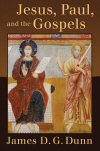
Jesus, Paul, and the Gospels brings together texts from three sets of lectures James Dunn gave in 2009 to Catholic and Jewish audiences in Italy, Spain, and Israel. The resulting book uniquely presents the Gospels to a Jewish audience and Paul to a Catholic audience—all from a scholarly Protestant perspective. Written to introduce well-informed people to unfamiliar topics, this book is ideal for readers and students of various backgrounds both within and beyond the Christian community.
Jesus, Paul, and the Gospels forms both a capstone and an introduction to Jimmy Dunn’s groundbreaking works about the beginnings of Christianity. If I had only one volume to put in the hands of someone who asked, ‘Where do I begin to read Dunn?’ this would be the book.
—Scot McKnight, professor of New Testament, Northern Baptist Theological Seminary
In this clear and insightful book, James Dunn offers a concise yet panoramic view of the origins of the early Jesus movement—a subject in which he has long been a proven master.
—Bruce W. Longenecker, professor of religion and W. W. Melton Chair, Baylor University
Anyone seeking an introduction to Jesus, Paul, the Gospels, and their interconnections will find no better book than this. The fruit of a lifetime of research by a master scholar-teacher, it is vintage Dunn: clear, concise, creative, and credible.
—Michael J. Gorman, Raymond E. Brown Chair in Biblical Studies and Theology, St. Mary’s Seminary and University
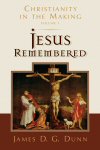
James Dunn is regarded worldwide as one of today’s foremost biblical scholars. Having written groundbreaking studies of the New Testament and a standard work on Paul’s theology, Dunn here turns his pen to the rise of Christianity itself. Jesus Remembered is the first installment in a monumental three-volume history of the first 120 years of the faith.
Focusing on Jesus, this first volume has several distinct features. It garners the lessons to be learned from the “quest for the historical Jesus” and meets the hermeneutical challenges to a historical and theological assessment of the Jesus tradition. It provides a fresh perspective both on the impact made by Jesus and on the traditions about Jesus as oral tradition—hence the title “Jesus Remembered.” And it offers a fresh analysis of the details of that tradition, emphasizing its characteristic (rather than dissimilar) features. Noteworthy too are Dunn’s treatments of the source question (particularly Q and the noncanonical Gospels) and of Jesus the Jew in his Galilean context.
In his detailed analysis of the Baptist tradition, the kingdom motif, the call to and character of discipleship, what Jesus’ audiences thought of him, what he thought of himself, why he was crucified, and how and why belief in Jesus’ resurrection began, Dunn engages wholeheartedly in the contemporary debate, providing many important insights and offering a thoroughly convincing account of how Jesus was remembered from the first, and why.
Written with peerless scholarly acumen yet accessible to a wide range of readers, Dunn’s Jesus Remembered, together with its successor volumes, will be a sine qua non for all students of Christianity’s beginnings.
This tome takes its place among the equally voluminous and deep contributions of scholars like Crossan, John Meier, N.T. Wright, and Walter Wink. . . Most important for preachers is the way Dunn interprets the words and deeds of Jesus and stories of his life as an unfolding, living tradition of interpretation. It helps us to understand our own work as part of that unfolding, living tradition. . . .
—Homiletic
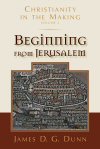
Beginning from Jerusalem covers the early formation of the Christian faith from 30 to 70 AD. After outlining the quest for the historical church (parallel to the quest for the historical Jesus) and reviewing the sources, James Dunn follows the course of the movement stemming from Jesus “beginning from Jerusalem.”
He opens with a close analysis of what can be said of the earliest Jerusalem community, the Hellenists, the mission of Peter, and the emergence of Paul. Then Dunn focuses solely on Paul—the chronology of his life and mission, his understanding of his call as apostle, and the character of the churches that he founded. The third part traces the final days and literary legacies of the three principal figures of first-generation Christianity: Paul, Peter, and James the brother of Jesus. Each section includes detailed interaction with the vast wealth of secondary literature on the many subjects covered.
Mastery of the primary and secondary sources, creativity balanced by sound judgment, and breadth of treatment based upon thorough attention to the details: this is what we have come to expect from James Dunn, and this is what we have in this book. A magnificent review and evaluation of all the major critical issues regarding the first forty years of the Christian religion.
—Dale C. Allison Jr., professor of New Testament, Princeton Theological Seminary
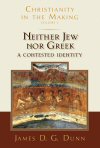
The third and final installment of James Dunn’s magisterial history of Christian origins through 190 AD, Neither Jew nor Greek: A Contested Identity covers the period after the destruction of Jerusalem in 70 AD through the second century, when the still-new Jesus movement firmed up its distinctive identity markers and the structures on which it would establish its growing appeal in the following decades and centuries.
Dunn examines in depth the major factors that shaped first-generation Christianity and beyond, exploring the parting of the ways between Christianity and Judaism, the Hellenization of Christianity, and responses to Gnosticism. He mines all the first- and second-century sources, including the New Testament Gospels, New Testament apocrypha, and such church fathers as Ignatius, Justin Martyr, and Irenaeus, showing how the Jesus tradition and the figures of James, Paul, Peter, and John were still esteemed influences but were also the subject of intense controversy as the early church wrestled with its evolving identity.
Comprehensively covering an important, complex era in Christianity that is often overlooked, this volume is a landmark contribution to the field.
Here we have on full display the distilled fruits of decades of research and engagement by a mature scholar of the first rank. James Dunn engages a vast range of secondary and primary literature in a way that only a senior scholar can do, synthesizing the best insights, critically and meticulously evaluating all sources and hypotheses, and producing a masterpiece of erudition that will be foundational for future work on the subject. While respectfully interacting with a range of scholarship, this work also forges its own noteworthy conclusions, in the process sometimes challenging conventional assumptions from across the spectrum of scholarly opinion.
—Craig S. Keener, professor of New Testament, Asbury Theological Seminary
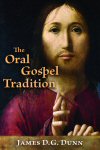
The traditions about Jesus and his teaching circulated in oral form for many years, continuing to do so for decades following the writing of the New Testament Gospels. The Oral Gospel Tradition, a collection of 15 essays by James Dunn, discusses such issues as the role of eyewitnesses and of memory, how the Jesus tradition was shaped by oral usage, and the importance of seeing the biblical materials not so much as frozen writing but as living tradition.
Over many years Jimmy Dunn has alerted us all to the importance of taking seriously the presence of oral tradition in and behind our present Gospels. This volume provides many of his key essays on that broad topic, including a number of responses to critiques by others. As with all of Dunn’s work, the argument is invariably readable, persuasive, and compelling. This will be an invaluable resource for all those engaged in study of the Gospels, their sources, and their witness to the person of Jesus.
—Christopher Tuckett, professor of New Testament studies, University of Oxford
This book helpfully brings together a number of significant essays by a leading voice in the study of Jesus, the Gospels, and early Christian tradition. As indicated by the new and very helpful introduction, the collection not only surveys Dunn's own voluminous work on the topic but also serves, in many respects, as a recent history of research, tracing trends in the evolution of study on the media history of early Christianity.
—Tom Thatcher, professor of New Testament, Cincinnati Christian University
For more than 35 years, James Dunn has been a leading voice in New Testament studies regarding the role of oral tradition in the formation of Gospel narratives. This volume affords Dunn the opportunity to respond to criticisms of his various proposals and so to present time-honored ideas afresh for a new generation. Anyone who seeks to understand the Gospels as a living tradition will appreciate this book and benefit from Dunn’s rich contributions to the field.
—Mark Allan Powell, Robert and Phyllis Leatherman Professor of New Testament, Trinity Lutheran Seminary

The Epistles of Paul to the Ephesians and Colossians
- Author: F.F. Bruce
- Publisher: Eerdmans
- Publication Date: 1965
- Pages: 328
Two champion theologians, F. F. Bruce and Edmond Kidley Simpson, bring us an outstanding commentary on the New Testament books of Ephesians and Colossians. The Epistle to the Ephesians and the Colossians one of the original New International Commentary volumes—provides a verse-by-verse journey through both of those two epistles, each preceded with a comprehensive introductory section. The thought-provoking and comprehensive commentary found within this volume works as an excellent companion to a student's research, a pastor's sermon preparation, and the daily Bible study of laity.
Within The Epistle to the Ephesians and the Colossians, Paul's words to the people of Ephesus and Colossae are elucidated. This essential work is packed with powerful commentary that can be referenced with the click of a mouse when running a Passage Guide Search. The cross-references found within can be instantaneously accessed with a mouse-over, and the commentary can be linked to your preferred Bible
Professor F. F. Bruce was born in Elgin, Scotland, and received his education at the universities of Aberdeen, Cambridge and Vienna. He was lecturer in Greek at the Universities of Edinburgh and Leeds, and then moved on to Sheffield, where he served as Professor of Biblical History and Literature. He was appointed Rylands Professor of Biblical Criticism and Exegesis at the University of Manchester in 1959. He died in 1990.
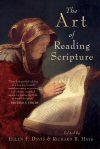
The Art of Reading Scripture is written by a group of eminent scholars and teachers seeking to recover the church’s rich heritage of biblical interpretation in a dramatically changed cultural environment. Asking how best to read the Bible in a postmodern context, the contributors together affirm “Nine Theses” that provide substantial guidance for the church. The essays and sermons that follow both amplify and model the approach to Scripture outlined in the Nine Theses.
Lucidly conceived, carefully written, and packed with fresh insights, The Art of Reading Scripture proposes a far-reaching revolution in how the Bible is taught in theological seminaries, calling pastors and teachers in the church to rethink their practices of using the Bible.
‘Theological interpretation,’ like a modern-day holy grail, is mentioned often, but claims of actual sightings are both few and exaggerated. Ellen Davis and Richard Hays have given us access to a multidisciplinary conversation concerned with and exemplifying the genuine relocation of the Bible within the church—that is, as authoritative Scripture. The result is a bold, impassioned, open-ended invitation and guide to the craft of reading Scripture. This is must reading for Christian pastors, theological students, exegetes, theologians, and preachers.
—Joel B. Green, professor of New Testament Interpretation, Fuller Theological Seminary
Richard B. Hays is dean and the George Washington Ivey Professor of New Testament at Duke Divinity School in Durham, North Carolina. He is internationally recognized for his work on the letters of Paul and on New Testament ethics. His book The Moral Vision of the New Testament was selected by Christianity Today as one of the 100 most important religious books of the twentieth century.
Ellen F. Davis is Amos Ragan Kearns Professor of Bible and Practical Theology at Duke University Divinity School in Durham, North Carolina.
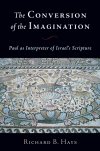
The Conversion of the Imagination contains some of the best work on Paul by first-rate New Testament scholar Richard B. Hays. These essays probe Paul’s approach to scriptural interpretation, showing how Paul’s reading of the Hebrew Scriptures reshaped the theological vision of his churches. Hays’ analysis of intertextual echoes in Paul’s letters has touched off exciting debate among Pauline scholars and made the contours of Paul’s thought more recognizable. These studies contain some of the early work leading up to Hays’ seminal Echoes of Scripture in the Letters of Paul. They also show how Hays has responded to critics and further developed his thought in the years since. Among the many subjects covered here are Paul’s christological application of Psalms, Paul’s revisionary interpretation of the Law, and the influence of the Old Testament on Paul’s ethical teachings and ecclesiology.
Hays’ own lyrical and evocative style of writing is an ideal vehicle for exploring Paul’s own lyrical and evocative uses of Scripture. . . . Richard Hays has made a seminal contribution to biblical hermeneutics. . . . It is always fruitful to be in dialogue with him.
—Review of Biblical Literature
Richard B. Hays is dean and the George Washington Ivey Professor of New Testament at Duke Divinity School. He is internationally recognized for his work on the letters of Paul and on New Testament ethics. His book, The Moral Vision of the New Testament, was selected by Christianity Today as one of the 100 most important religious books of the twentieth century.
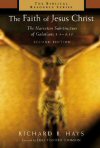
Widely praised as a major contribution to Pauline studies, Richard B. Hays's Faith of Jesus Christ now features, in this expanded second edition, a foreword by Luke Timothy Johnson, a new introduction by Hays, and a substantial dialogue with James D. G. Dunn.
In this important study Hays argues against the mainstream that any attempt to account for the nature and method of Paul's theological language must first reckon with the centrality of narrative elements in his thought. Through an in-depth investigation of Galatians 3:1–4:11, Hays shows that the framework of Paul's thought is neither a system of doctrines nor his personal religious experience but the “sacred story” of Jesus Christ. Above all, Paul's thought is guided by his concern to draw out the implications of the gospel story, particularly how the “faith of Jesus Christ” reflects the mission of the church.
This rich and remarkably mature study provides new perspectives on all of Paul’s thought and his place in earliest Christianity.
—Religious Studies Review
Richard B. Hays is George Washington Ivey Professor of New Testament at Duke Divinity School, Durham, North Carolina.
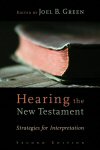
In this text, a distinguished group of scholars introduces and illustrates the array of strategies and methods used in New Testament study today. Standard approaches—text criticism, historical methods, etc.—appear side by side with newer approaches—narrative criticism, Latino-Latina hermeneutics, theological interpretation of the New Testament, and more. First published in 1995, Hearing the New Testament is now revised and updated, including rewritten chapters, new chapters, and new suggestions for further reading.
Highly recommended for supplementary reading in New Testament classes. Its general accuracy, moderation, freedom from bias, and concision are welcome.
—Religious Studies Review
Joel B. Green is professor of New Testament interpretation and associate dean for the Center of Advanced Theological Studies at Fuller Theological Seminary in Pasadena, California.
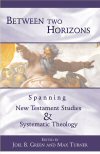
This book constructively explores the question: What effects should an interest in theology produce in the reading of Scripture? Since the onset of historical consciousness in biblical studies over two centuries ago, the work of biblical exegetes and systematic theologians have largely followed two paths. In this book, nine prominent scholars work to bridge the longstanding gap between biblical studies and theology by concentrating on the nature of a biblical hermeneutics approach to doing theology. The range of concerns presented by these scholars seeks to reintegrate biblical exegesis with contemporary theology in the service of the church.
Between Two Horizons is a thoughtful presentation of the major issues that have separated exegesis and theology in the past, and it provides a blueprint for the construction of a bridge between the two disciplines.
—Pacifica
Joel B. Green is professor of New Testament interpretation, associate dean for the Center of Advanced Theological Studies, and dean of the School of Theology at Fuller Theological Seminary, Pasadena, California. He is the editor of the New International Commentary on the New Testament series.
Max Turner is professor of New Testament studies at London School of Theology.
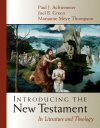
Introducing the New Testament is a helpful guide to the writings of the New Testament, relevant for experienced Bible students and those approaching the Christian Scriptures for the first time. Written by three leading Bible specialists, this book discusses the New Testament’s literature in a clear and balanced way. Wonderfully readable and well supplied with maps and photographs, this volume is both an ideal textbook for courses covering the New Testament, and a useful introduction for general readers looking for straight-forward instruction on the writings of the New Testament. Additional chapters also explore the types of literature found in the New Testament, the life and teachings of Jesus, Paul’s life and world, and the formation of the New Testament canon. Sidebars also offer a wealth of highly relevant background information that helps modern readers more fully grasp biblical themes.
Anyone coming to the New Testament for the first time needs a clear and comprehensible guide, abreast of recent scholarship but not forbiddingly long or technical. Here it is.
—N. T. Wright, professor of New Testament and Early Christianity, St. Andrews University
Marianne Meye Thompson is George Eldon Ladd Professor of New Testament at Fuller Theological Seminary in Pasadena, California, and an ordained minister of the Presbyterian Church (USA). Her previous books include The Exegetical Commentary on John and the Johannine Epistles.
Joel B. Green is the professor of New Testament interpretation and associate dean of the Center for Advanced Theological Studies at Fuller Theological Seminary in Pasadena, CA. He is the author or editor of numerous books, including the the Dictionary of Jesus and the Gospels, Introducing the New Testament, and commentaries on Luke and 1 Peter. He is also editor-in-chief of the Journal of Theological Interpretation.
Paul J. Achtemeier is professor emeritus of biblical interpretation at Union Theological Seminary in Richmond, Virginia. He is the author of many books, including the Interpretation Commentary on Romans. He is also a past president of the Society of Biblical Literature and the Catholic Biblical Association.
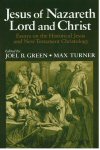
The problem of the historical Jesus remains one of the most important themes in New Testament scholarship. Closely related to this problem is the question, How far can the impact made by the earthly Jesus and his own self-understanding sustain the weight of the Christological construction put upon them by the early church? In the past two decades some scholars have taken an increasingly gloomy attitude toward the possibility of knowing anything of substance about Jesus from the Gospels or, at the opposite extreme, have sometimes made outlandish claims about him. Others, like the contributors of this volume, have begun moving the discussion into fresh areas of creative, responsible inquiry.
Written in honor of I. Howard Marshall on the occasion of his 60th birthday, Jesus of Nazareth: Lord and Christ honors this distinguished scholar by reflecting his longstanding interest in Luke-Acts, his concern for the historical Jesus, and his stress on the significance of Jesus’ person and work in New Testament interpretation. Providing new insights and breaking new ground, the thirty outstanding essays in this volume offer a fresh assessment of New Testament data and methods pertinent to our understanding of Jesus and his significance both in his time and in ours.
This collection of outstanding essays by veteran scholars and by younger scholars who are rapidly advancing in the field of New Testament is a fitting tribute to Professor I. Howard Marshall, who is himself a scholar of the first order. Jesus of Nazareth: Lord and Christ is well focused, its themes and passages carefully chosen and expertly considered. Readers looking for studies that address many of the most important issues relating to the historical Jesus and the emergence of New Testament Christology will not be disappointed. I highly recommend this book.
—Craig A. Evans, professor of New Testament, Trinity Western University
Joel B. Green is professor of New Testament interpretation, associate dean for the Center of Advanced Theological Studies, and dean of the School of Theology at Fuller Theological Seminary, Pasadena, California. He is the editor of the New International Commentary on the New Testament series.
Max Turner is professor of New Testament studies at London School of Theology.
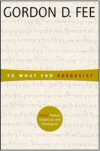
Over the past 25 years Gordon D. Fee has produced a steady stream of articles and academic papers addressing thorny text-critical issues, delicate exegetical concerns, and profound theological matters. Many of these scholarly pieces have made significant contributions to the field of New Testament studies, but they have been scattered in a wide range of publications. Now, 21 of Fee’s finest shorter works are conveniently available together in a single resource.
In many ways this collection reflects Fee’s own journey as a biblical scholar. The volume begins with Fee’s early work in textual criticism, turns to studies more strictly exegetical in nature, and concludes with studies more theological in intent. In the course of these studies Fee explores a wide range of concerns for readers and interpreters of the New Testament, including Paul as an early Trinitarian thinker, freedom and obedience according to Paul, New Testament Christology and pneumatology, and much more. These fine studies amply demonstrate Fee’s mastery of the exegetical task and illustrate the goal of exegesis in the service of the believing Christian community.
Certain to be consulted and read frequently, To What End Exegesis? will provide teachers, pastors, and serious students of the Bible with a robust banquet of New Testament scholarship.
Gordon D. Fee (b. 1934) is a leading expert in pneumatology and textual criticism of the New Testament. He is an ordained minister of the Assemblies of God and currently serves as professor emeritus of New Testament studies at Regent College in Vancouver, British Columbia.
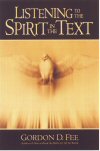
For many years Gordon Fee, one of today’s foremost evangelical scholars, has been asked to bring his trusted biblical expertise together with his well-known passion for the gospel and the church. Listening to the Spirit in the Text is his answer. Gathered here are Fee’s best studies and reflections on the art of attending to the biblical text critically yet with a deep spiritual sensitivity. These insightful chapters cover a wide range of contemporary topics, including the relationship between Bible study and spirituality, gender issues, worship, tongues speaking, church order and leadership, the believer and possessions, and the role of the gospel in our global society.
This set of biblical explorations—mostly Pauline, as we would expect—demonstrates Gordon Fee’s strength in exegesis, biblical theology, and hermeneutics as he pursues his trinitarian, churchly, life-centered concerns. Fee is a Pentecostal pneumatologist without peer. In his large hearted service of the biblical text he is in every way a model. Brilliant and simple, these chapters will enrich all who take the Bible seriously.
—J.I. Packer, professor of theology, Regent College
Gordon D. Fee is professor emeritus of New Testament studies at Regent College in Vancouver, British Columbia. In addition to his many highly respected commentaries and biblical studies, he is also the author of Paul, the Spirit, and the People of God, Gospel and Spirit, and How to Read the Bible for All Its Worth.

Biblical Exegesis in the Apostolic Period
- Author: Richard M. Longenecker
- Publisher: Eerdmans
- Publication Date: 1999
- Pages: 268
The discovery of the Dead Sea Scrolls, the Nag Hammadi texts, and new Targums has greatly increased scholarly interest in the relationship between the New Testament and first-century Judaism. This critically acclaimed study sheds light on this relationship by exploring the methods the earliest Christians used to interpret the Old Testament. By comparing the first Christian writings with Jewish documents from the same period, Longenecker helps to discern both the key differences between Christianity and Judaism and the Judaic roots of the Christian faith. The original content has been largely unchanged, though a new forty-one page preface has been included to interact with particular topics of importance. Additions to references in the footnotes concerning recent significant developments and corrections of content in the text have been made. This second edition of Biblical Exegesis in the Apostolic Period seeks to introduce new findings and research since the original release in 1975.
A clear and illuminating analysis of the facts of biblical interpretation in the New Testament. . . . I welcome this scholarly and judicious book as a useful contribution.
—C.F.D. Moule
Richard N. Longenecker served as Distinguished Professor of New Testament at McMaster Divinity College and taught for many years at Wycliffe College in the University of Toronto. He is now retired. His education includes B.A. and M.A. degrees from Wheaton College, and a Ph.D. from New College in the University of Edinburgh. He was also honored with a D.D. from Wycliffe College. Author of numerous books, his volume of Word Biblical Commentary, Volume 41: Galatians is currently available for download. He is presently working on a major commentary on Paul's Epistle to the Romans, to be published in the New International Greek Testament Commentary series.
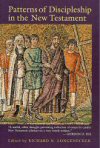
Patterns of Discipleship in the New Testament is a great resource for diving into biblical discipleship. The inaugural volume of the McMaster New Testament Series—sponsored by McMaster Divinity College in order to address central New Testament themes—this first volume is designed like a symposium, compiling 13 rigorous yet accessible essays by world-class biblical scholars on discipleship in the New Testament. A text which Gordon Fee called “a useful, often thought-provoking collection of essays by careful New Testament scholars on a very timely subject,” Patterns of Discipleship in the New Testament is both scholarly and pastoral in style and content. These articles dive into the intricacies of discipleship as displayed in the New Testament from Matthew to Revelation. This text is a treasury of practical insight for the good work of discipleship, building from the premise that, as editor Richard Longenecker puts it: “[discipleship] needs better biblical rootage than it usually receives in the popular press and better personal application than it usually receives in scholarly writings.” Patterns of Discipleship in the New Testament seeks to provide both, encouraging you to grow in biblical knowledge as well as in practical discipleship.
Readers . . . who are struggling to define and implement strategies for discipleship in the churches will find this volume helpful and provoking as a pretext and foundation for their work. As to the readability, the authors have hit their intended mark in most cases, creating a collection of accessible and intelligent essays for the layperson and clergyperson alike.
—Reformed Review
Richard N. Longenecker served as distinguished professor of New Testament at McMaster Divinity College and taught for many years at Wycliffe College in the University of Toronto. His education includes a BA and MA from Wheaton College, and a PhD from New College in the University of Edinburgh. He was also honored with a DD from Wycliffe College. He is the author of numerous books, including Galatians: Word Biblical Commentary, Christology in the New Testament, and The Challenge of Jesus’ Parables.
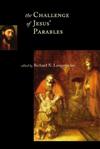
This volume presents a fresh look at the meaning of Jesus' parables for Christian living today through a collection of essays by some of the top contemporary biblical scholars.
The parables recorded in the Gospels are central for an understanding of Jesus and his ministry. Yet the parables are more than simple stories; they present a number of obstacles to contemporary readers hoping to fully grasp their meaning. In this volume, thirteen New Testament scholars provide the background necessary to understand the original context and meaning of Jesus’ parables as well as their modern applications, all in a manner easily accessible to general readers.
Clearly written, stimulating and challenging. The volume as a whole is to be strongly recommended and gives new insights into these fascinating stories.... A welcome addition to the recent literature on the parables.
—The Expository Times
Richard N. Longenecker served as distinguished professor of New Testament at McMaster Divinity College and taught for many years at Wycliffe College in the University of Toronto. His education includes a BA and MA from Wheaton College, and a PhD from New College in the University of Edinburgh. He was also honored with a DD from Wycliffe College. He is the author of numerous books, including Galatians: Word Biblical Commentary, Christology in the New Testament, and The Challenge of Jesus’ Parables.
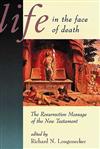
Life is for living, but there is also a dark side of life — the mocking specter of death that permeates every facet of human activity and invades every corner of our consciousness. But death is not the final chapter for the people of God. The New Testament proclaims a message of resurrection life that is victorious over death. This volume, written by eleven first-class scholars, brings into focus the resurrection message of the New Testament. Much more than just biblical exposition, these essays demonstrate how the resurrection both provides the basis for joyful living now despite the shadow of death and undergirds the Christian belief in a future after death.
This book provides a gold mine of information to anybody who is interested in the theme of death and resurrection as it is described and treated in the New Testament. . . . The information is treated and presented in a responsible way, which makes the book reliable and therefore a valuable tool for research.
—Jan G. van der Watt, Review of Biblical Literature
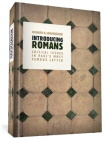
Introducing Romans: Critical Issues in Paul’s Most Famous Letter
- Author: Richard N. Longenecker
- Publisher: Eerdmans
- Publication Date: 2011
- Pages: 518
Paul’s Letter to the Romans has proven to be a particular challenge for commentators, with its many highly significant interpretive issues often leading to tortuous convolutions and even “dead ends” in their understanding of the letter. Here, Richard N. Longenecker takes a comprehensive look at the complex backdrop of Paul’s letter and carefully unpacks a number of critical issues.
This extended introduction to Romans is in effect the first installment of Dick Longenecker's forthcoming major commentary on the epistle, and publishing it separately has enabled him to deal more comprehensively with the issues than in any existing commentary. . . . I warmly commend it and look forward eagerly to the publication of the commentary whose harbinger it is.
—I. Howard Marshall, University of Aberdeen
Richard N. Longenecker is professor emeritus of New Testament at Wycliffe College, University of Toronto. His many books include The Christology of Early Jewish Christianity and The Message and Ministry of Paul.
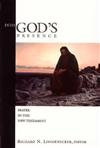
The Christian life cannot be fully understood or experienced without first grasping the importance of prayer. Yet prayer, as it is found in the Christian scriptures, has received limited attention as a topic of study. Into God’s Presence explores the nature and use of prayer throughout the entire New Testament. Written by twelve leading biblical scholars with diverse confessional perspectives, this insightful volume first discusses Christian prayer in relation to prayer in the Old Testament, the Greco-Roman world, first-century Judaism, and the Dead Sea Scrolls. The rest of the book takes an instructive look at prayer as it appears from Matthew to Revelation, with special attention given to Jesus as an exemplar and teacher of prayer.
A splendid collection of essays by a distinguished group of scholars. It is without doubt the best survey of its subject now available.
—Dale C. Allison Jr.
Richard N. Longenecker is professor emeritus of New Testament at Wycliffe College, University of Toronto. His many books include The Christology of Early Jewish Christianity and The Message and Ministry of Paul.
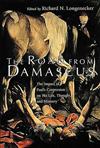
Conversion is intrinsic to the Christian religion. The most remarkable conversion recorded in the New Testament is that of Paul, and most Christians consider Christ's encounter with Paul to be a prototype of Christian conversion generally. This collection of eleven essays gives Paul's conversion a firmer rootage in the biblical materials while also emphasizing personal application. The contributors examine the nature of Paul's Damascus Road experience and the impact of that experience on his thought and ministry, and explore how Paul's experience functions as a paradigm for Christian thought and action today.
In short, while this work does not treat every major topic in Pauline thought, it forms a helpful primer on numerous key topics and their origins, admirably meeting the objectives of the series.
—Craig L. Blomberg, Denver Seminary Journal
Richard N. Longenecker is professor emeritus of New Testament at Wycliffe College, University of Toronto. His many books include The Christology of Early Jewish Christianity and The Message and Ministry of Paul.
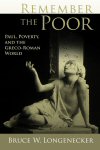
Many scholars engaged in exploring the economic dimensions of early Christianity simply don’t bother with Paul, mistakenly believing that he had little regard for the poor and that his theological deliberations therefore have little relevance to studies of wealth and poverty in the Greco-Roman world. In Remember the Poor, Bruce Longenecker counters this view, arguing persuasively that care for the impoverished was integral to Paul’s teaching and standard practice in the Jesus-groups that he founded. Longenecker sets out a robust “economy scale” for urban Greco-Roman society, using his in-depth analysis of poverty in the first century as the backdrop for a compelling presentation which integrates economics, history, exegesis, and theology. Questioning a number of established interpretive paradigms, Longenecker offers a fresh vision in which Paul’s convictions regarding care for the poor are shown to be historically significant and theologically challenging.
This important book reveals an economic dimension of Paul’s gospel that has only rarely been identified and never expounded so fully and convincingly. It also builds up a realistic picture of the way that care for the poor was embodied in the life of the communities Paul founded. Longenecker’s well-informed and careful arguments deserve wide attention.
—Richard Bauckham, professor of New Testament studies, St. Mary’s College
Bruce W. Longenecker is professor of religion and holds the W. W. Melton Chair at Baylor University. His books include Rhetoric at the Boundaries, The Lost Letters of Pergamum, and Engaging Economics: New Testament Scenarios and Early Christian Reception.

Bruce Waltke, who has been teaching and preaching the book of Psalms for over fifty years, skillfully establishes the meaning of the Hebrew text through the careful exegesis for which he is well known. James Houston traces the church's historical interpretation and use of these psalms, highlighting their deep spiritual significance to Christians through the ages.
Bruce K. Waltke is Distinguished Professor of Old Testament at Knox Theological Seminary, Fort Lauderdale, Florida, and professor emeritus of biblical studies at Regent College, Vancouver. He is the author of numerous books and Old Testament commentaries, including works on Genesis, Proverbs, and Micah.
James M. Houston is founding principal and former chancellor of Regent College and was the college’s first professor of spiritual theology. His books include Joyful Exiles: Life in Christ on the Dangerous Edge of Things and Letters of Faith through the Seasons: A Treasury of Great Christians’ Correspondence.
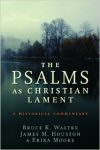
The Psalms as Christian Lament: A Historical Commentary
- Authors: Bruce K. Waltke, James M. Houston
- Publisher: Eerdmans
- Publication Date: 2014
While much modern scholarship has tended to “despiritualize” the Psalms, this collaboration by three evangelical scholars carefully attends to the two voices of the Holy Spirit—heard infallibly in Scripture and edifyingly in the church’s response.
The Psalms as Christian Lament, a sequel to The Psalms as Christian Worship, uniquely blends verse-by-verse commentary with a history of Psalms interpretation in the church to examine 10 lament psalms, including the seven traditional penitential psalms. Though C. S. Lewis called the “imprecatory” psalms “contemptible,” Waltke, Houston, and Moore show that they too are profitable for sound doctrine and so for spiritual health.
Bruce K. Waltke is distinguished professor of Old Testament at Knox Theological Seminary in Fort Lauderdale, Florida and professor emeritus of biblical studies at Regent College in Vancouver, BC. He is the author of numerous books and Old Testament commentaries, including works on Genesis, Proverbs, and Micah.
James M. Houston is founding principal and former chancellor of Regent College and was the college’s first professor of spiritual theology. His books include Joyful Exiles: Life in Christ on the Dangerous Edge of Things and Letters of Faith through the Seasons: A Treasury of Great Christians’ Correspondence.
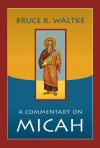
In this masterful commentary, respected biblical scholar Bruce Waltke carefully interprets the message of the prophet Micah, building a bridge between Micah’s ancient world and our life today.
Waltke’s commentary on Micah quickly distinguishes itself from other commentaries on this book by displaying an unprecedented exegetical thoroughness, an expert understanding of historical context, and a keen interest in illuminating the contribution of Micah to Christian theology. Tackling hard questions about date and authorship, Waltke contends that Micah himself wrote and edited the nineteen sermons comprising the book. Waltke’s clear analytical outline leads readers through the three cycles of Micah, each beginning with an oracle of doom and ending with an oracle of hope, decisively showing that hope wins over doom.
Learned yet amazingly accessible, combining scholarly erudition with passion for Micah’s contemporary relevance, this book will well serve teachers, pastors, and students alike.
No one knows the prophecy of Micah more thoroughly than Bruce Waltke. No one is more deeply ingrained in the secondary literature that discusses and debates this prophet. No one is better positioned to be a helpful guide to the correct interpretation and application of this marvelous book. It’s rare when a commentary is helpful to scholars, clergy, and laypeople alike, but Waltke has accomplished this masterfully.
—Tremper Longman III, Robert H. Gundry Professor of Biblical Studies, Westmont College
Bruce K. Waltke is distinguished professor of Old Testament at Knox Theological Seminary in Fort Lauderdale, Florida, and professor emeritus of biblical studies at Regent College, Vancouver. He is the author of numerous books and Old Testament commentaries, including works on Genesis, Proverbs, and Micah.
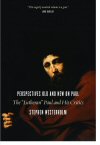
Here, finally, is a much-needed review and analysis of the divergent interpretations of Paul. With a clear head and winsome sense of humor, Stephen Westerholm compares the traditional understanding of Paul to more recent readings, drawing on the writings of key figures in the debate both past and present.
Westerholm first offers a detailed portrait of the “Lutheran” Paul, including the way such theologians as Augustine, Luther, Calvin, and Wesley have traditionally interpreted “justification by faith” to mean that God declares sinners “righteous” by his grace apart from “works.” Westerholm then explores how Paul has fared in the twentieth century, in which “New Perspective” readings of Paul see him teaching that Gentiles need not become Jews or observe Jewish law to be God’s people. The final section of the book looks anew at disputed areas of Paul’s theological language and offers compelling discussion on the place of both justification by faith and Mosaic law in divine redemption.
This eagerly awaited volume is a gem. After years of debate about the ‘new perspective,’ a debate bogged down with multiple confusions, Stephen Westerholm describes and analyzes all the main viewpoints on Paul’s theology of law, grace, and justification from Augustine onward. With enviable clarity, incisive observation, and shafts of humor, Westerholm reaffirms and refines the ‘old perspective’ while also incorporating the strong points of the new. This is the book we all have needed, both scholars and students. It will surely help us escape the impasse in our current debates.
—John Barclay, Lightfoot Professor of Divinity, Durham University
Stephen Westholm is professor of biblical studies at McMaster University in Hamilton, Ontario. His other books include Preface to the Study of Paul and Israel’s Law and the Church’s Faith: Paul and His Recent Interpreters.
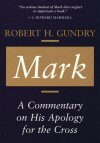
The first full-length critical commentary on the Greek text of Mark to appear in English in a long time. Gundry says that Mark constitutes a straightforward defense of the apparently shameful manner of Jesus’ death, and as such Mark’s Gospel is essentially an evangelistic tract rather than an obliquely written handbook of Christian discipleship and church life.
A major contribution to Markan scholarship . . . An indispensable resource for scholars, students, and pastors.
—John R. Kohlenberger III, lecturer, consultant, and adjunct instructor in Bible and biblical language, Multnomah Bible College and Western Seminary
Robert H. Gundry is scholar-in-residence and emeritus professor of New Testament and Greek at Westmont College in Santa Barbara, California. He is the author of the bestselling classroom text A Survey of the New Testament.
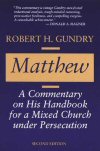
Matthew: A Commentary on His Handbook for a Mixed Church under Persecution, 2nd ed.
- Author: Robert H. Gundry
- Edition: 2nd
- Publisher: Eerdmans
- Publication Date: 1994
- Pages: 744
Heralded as “an epoch-making book” by F. F. Bruce when it first appeared, Robert H. Gundry’s commentary on the Gospel of Matthew stands as a benchmark in biblical scholarship and modern methodology. No commentary in recent history has sparked such passionate discussion among evangelical scholars, and scholars of other persuasions have also paid considerable attentions to this work.
In response to the plethora of evaluations afforded this text since its publication in 1982, Gundry has issued this second edition. Included are an extensive new preface taking up criticisms that reviewers and other readers lodged against the first edition, a new appendix, and 225 new endnotes that expanded the commentary and provide fresh reflections on the text.
A remarkable commentary on Matthew.
—Frans Neirynck, professor of New Testament and Christian origins, Duke University
Robert H. Gundry is scholar-in-residence and emeritus professor of New Testament and Greek at Westmont College in Santa Barbara, California. He is the author of the bestselling classroom text A Survey of the New Testament.
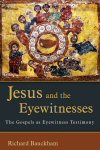
In Jesus and the Eyewitnesses: The Gospels as Eyewitness Testimony, Richard Bauckham argues that the four Gospels are closely based on the eyewitness testimony of those who personally knew Jesus. Drawing on internal literary evidence, the use of personal names in first-century Jewish Palestine, and cognitive psychology, Bauckham challenges the prevailing assumption that the accounts of Jesus circulated as “anonymous community traditions.” Instead, he asserts that they were transmitted in the names of the original eyewitnesses.
Bauckham has delivered a remarkable and insightful volume that is sure to offer a much-needed challenge to the status quo in modern gospel studies.
—Westminster Theological Journal
Richard Bauckham is professor emeritus of New Testament studies at the University of St. Andrews, Scotland, and senior scholar at Ridley Hall, Cambridge. A fellow of both the British Academy and the Royal Society of Edinburgh, he has also written Bible and Mission: Christian Witness in a Postmodern World.
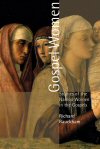
Gospel Women: Studies of the Named Women in the Gospels offers fresh perspectives on the women who appear of in the Gospels. Richard Bauckham provides an in-depth study of both the individual women who appear in the Gospels and the specific passages in which they appear. This unique approach reveals that there is much more to be known about the women than previous studies have assumed. Employing historical and literary readings of the biblical texts, Bauckham successfully captures the uniqueness of each woman he studies.
Richard Bauckham is well known for his encyclopedic knowledge of early Judaism and its offshoot, early Jewish Christianity. Here he applies that depth of knowledge to a specific important subject—the named women in the Gospels. The results are not only illuminating but exciting. This is an invaluable resource on the subject. Highly recommended!
—Ben Witherington III, professor of New Testament interpretation, Asbury Theological Seminary
Richard Bauckham is professor emeritus of New Testament studies at the University of St. Andrews, Scotland, and senior scholar at Ridley Hall, Cambridge. A fellow of both the British Academy and the Royal Society of Edinburgh, he has also written Bible and Mission: Christian Witness in a Postmodern World.
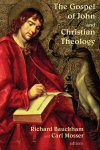
In recent years, the disciplines of biblical studies and systematic theology have grown apart and largely lost the means of effective communication with one another. Due to its profound influence on the development of Christian theology, John’s Gospel is an ideal base for rekindling dialogue between biblical studies and systematic theology. The essays here consider this Gospel from many angles, addressing a number of key issues that arise from a theological discussion of this text: John’s dualism in our pluralist context, historicity and testimony, the treatment of Judaism, Christology, and more.
Richard Bauckham is professor emeritus of New Testament studies at the University of St. Andrews, Scotland, and senior scholar at Ridley Hall, Cambridge. A fellow of both the British Academy and the Royal Society of Edinburgh, he has also written Bible and Mission: Christian Witness in a Postmodern World.
Carl Mosser is assistant professor of biblical studies at Eastern University, St. Davids, Pennsylvania.

The First and Second Epistles to the Thessalonians
- Author: Leon Morris
- Publisher: Eerdmans
- Publication Date: 1991
- Pages: 278
In The First and Second Epistles to the Thessalonians, noted theologian Leon Morris introduces the reader to the Church at Thessalonica, then provides stirring verse-by-verse commentary for Paul’s epistles directed there. This indispensable work is at the forefront of Thessalonian studies, and it is a great addition to the library of any theologian, biblical scholar, student of the Bible, or layperson.
Leon Morris (1914–2006) retired as principal of Ridley College in Melbourne, Australia, in 1979. He was the author of more than 40 books, including The Apostolic Preaching of the Cross, the volumes on Matthew and Romans in The Pillar New Testament Commentary, and the volumes on John.

The Lord from Heaven: A Study of the New Testament Teaching on the Deity and Humanity of Jesus Christ
- Author: Leon Morris
- Publisher: Eerdmans
- Publication Date: 1958
- Pages: 112
The purpose of The Lord from Heaven: A Study of the New Testament Teaching on the Deity and Humanity of Jesus is to give a short and simple outline of the main lines of New Testament thought about the Person of Christ. In particular, Leon Morris makes clear that witness is consistently born to two great truths—that Jesus Christ was God and that He was man. Though the terminology varies the various writers are in impressive basic agreement. Since the book is intended for the general reader rather than the specialist, he has avoided discussion of controversial points. Morris' aim throughout has not been to clear up matters which are in dispute, but to set out what the New Testament has to say on the subject.
Leon Morris (1914–2006) retired as principal of Ridley College in Melbourne, Australia, in 1979. He was the author of more than 40 books, including The Apostolic Preaching of the Cross, the volumes on Matthew and Romans in The Pillar New Testament Commentary, and the volumes on John.
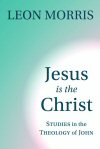
More than simply a series of chapters on the theology of John’s Gospel, Jesus Is the Christ relates each of John’s teachings to his declared aim, expressed in John 20:30–31: “Jesus did many other signs before his disciples, which have not been written in this book; but these have been written that you may believe that Jesus is the Christ, the Son of God, and that believing you may have life in his name.” Each chapter in Morris’ book takes up some facet or aspect of John’s expressed aim. For an age still asking the question “who is Jesus?,” Leon Morris argues convincingly that John’s entire Gospel was written to show that the human Jesus is the Christ, or Messiah, as well as the Son of God. But it is Morris’ firm conviction that John’s purpose was evangelical as well as theological—that is, John wrote his book so that readers might believe in Christ and as a result have eternal life.
Leon Morris (1914–2006) retired as principal of Ridley College in Melbourne, Australia, in 1979. He was the author of more than 40 books, including The Apostolic Preaching of the Cross, the volumes on Matthew and Romans in The Pillar New Testament Commentary, and the volumes on John.
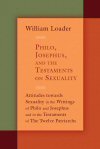
In this volume, William Loader examines three substantial and historically important sets of documents—the writings of Philo of Alexandria, the writings of Josephus, and the Testaments of the Twelve Patriarchs. Challenging stereotypes of both Philo’s and Josephus’ perspectives on sexuality, Loader’s detailed analyses provide a comprehensive investigation of this subject.
Loader’s research is both detailed and comprehensive in matters related to sexual behavior in these texts. . . . A valuable resource for those interested in exploring sexual attitudes in Hellenistic Jewish literature.
William Loader is professor emeritus of New Testament at Murdoch University, Perth, Australia. In 2010, he completed a five-year Australian Research Council professional fellowship project: Attitudes towards Sexuality in Judaism and Christianity in the Hellenistic Greco-Roman Era. Loader is the author of numerous books, including Sexuality in the New Testament: Understanding the Key Texts
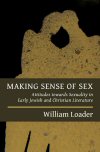
In Making Sense of Sex: Attitudes towards Sexuality in Early Jewish and Christian Literature, William Loader examines writings from the Greco-Roman period, relating their perspectives on sex. Loader also engages with the academic discourse surrounding the writings, allowing for a thorough investigation of both the primary sources and the existing interpretations of the writings. Through supporting readers in their study of these ancient texts, Loader provides a basis for informed discussion of sexual issues today.
Here William Loader presents his main conclusions in a highly accessible format. The lucid prose, anchored with references to primary sources, makes it an indispensable resource for students, but scholars will also find much value in the concise overview. . . . Loader is clearly a worldwide leading expert on sexuality in early Judaism and early Christianity, and his command of the material is detectable on every page.
—Margaret Y. MacDonald, professor of New Testament, St. Francis Xavier University
William Loader is professor emeritus of New Testament at Murdoch University, Perth, Australia. In 2010, he completed a five-year Australian Research Council professional fellowship project: Attitudes towards Sexuality in Judaism and Christianity in the Hellenistic Greco-Roman Era. Loader is the author of numerous books, including Sexuality in the New Testament: Understanding the Key Texts
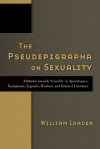
In this volume, William Loader investigates a diverse collection of more than 40 Jewish apocryphal and pseudepigraphal writings and fragments composed between the third century BC and the end of the first century AD. Judith, Tobit, 2 Enoch, Susannah—these and many other writings reveal a complex amalgam of attitudes and mores related to sexuality in early Jewish culture. Loader analyzes each book or fragment in its own literary context and draws out significant trends and themes that run through the entire corpus, offering rich reflection on sexuality during that period.
This volume on Jewish Pseudepigrapha is a rich resource for anyone interested in the cultural sources of the positions on sexuality adopted by contemporary religious communities.
—Harold Attridge, Sterling Professor of Divinity, Yale Divinity School
William Loader is professor emeritus of New Testament at Murdoch University, Perth, Australia. In 2010, he completed a five-year Australian Research Council professional fellowship project: Attitudes towards Sexuality in Judaism and Christianity in the Hellenistic Greco-Roman Era. Loader is the author of numerous books, including Sexuality in the New Testament: Understanding the Key Texts
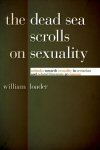
The discovery of the Dead Sea Scrolls brought to light the richest collection of early Jewish writings ever retrieved from the ancient world, including copies of biblical writings centuries older than other surviving manuscripts. The gradual publication of these writings unleashed a flurry of research and considerable speculation. One area of speculation concerns the understanding of sexuality in the ancient Jewish world. In The Dead Sea Scrolls on Sexuality, William Loader investigates the Temple Scroll; 4QMMT; the Damascus Document; and a number of legal, liturgical, wisdom, and exegetical documents. These texts treat a wide range of matters pertaining to sexuality, from ritual and cultic concerns to visions of human community and family in future expectation. Far from the common view that the writers of the Scrolls held a low view of sexuality and marriage, Loader concludes that most of these sources reflect an affirmative stance towards sex and marriage within a framework of clear boundaries marking out where sex did and did not belong.
An excellent, much-needed study. I especially appreciate Loader’s engagement with others’ research—a particular strength of the work—and his up-to-date bibliography. This book will generate lively discussion among Scrolls scholars.
—Kelley Coblentz Bautch, associate professor of religious studies, St. Edwards University
William Loader is professor emeritus of New Testament at Murdoch University, Perth, Australia. In 2010, he completed a five-year Australian Research Council professional fellowship project: Attitudes towards Sexuality in Judaism and Christianity in the Hellenistic Greco-Roman Era. Loader is the author of numerous books, including Sexuality in the New Testament: Understanding the Key Texts
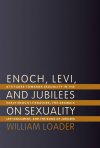
In Enoch, Levi, and Jubilees on Sexuality, William Loader first discusses the early Enoch literature relevant to the theme, and then examines the fragmentary Aramaic Levi Document as a whole. He finally considers Jubilees as a cumulative work, building on both the Enoch tradition and the instruction of Levi, and reveals a range of devices warning against sexual depravity. Loader’s aim throughout is to interpret the works from within, examining literary form, context, sequence, and tradition and redaction, reflecting engagement with current research in this area.
Loader’s monograph provides a significant and positive contribution to contemporary study of the Book of Jubilees. His focus on the role of sexuality in the thought-world of Jubilees synthesizes many important studies of Jubilees. He models the value of sustained attention to the vocabulary of sexuality—in Ethiopic, Latin, and Hebrew—and translation patterns, but also charts the sustained and often surprising aspects of sexuality in a number of key narratives . . .
—John C. Endres, professor of sacred Scripture (Old Testament), Jesuit School of Theology at Berkeley
William Loader is professor emeritus of New Testament at Murdoch University, Perth, Australia. In 2010, he completed a five-year Australian Research Council professional fellowship project: Attitudes towards Sexuality in Judaism and Christianity in the Hellenistic Greco-Roman Era. Loader is the author of numerous books, including Sexuality in the New Testament: Understanding the Key Texts
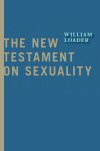
In The New Testament on Sexuality, William Loader explores the relevant cultural contexts and looks at New Testament texts related to sexuality, highlighting both the warnings about sexual wrongdoing and the affirmations of sexual union. He deals with specific themes such as divorce, same-sex relations, women and men in leadership, and celibacy; individual behavior, gender roles and rules, preferences, and hopes also fall under the scope of his investigation. Broad-ranging and thorough, this book engages both the biblical texts and the diverse ways in which they have been interpreted.
The New Testament on Sexuality is essential reading for scholars and students alike. Throughout the book Loader reveals his mastery not only of the New Testament but also of Jewish and Greco-Roman sources. One finds detailed examination of some of the most difficult and highly contentious issues related to New Testament evidence, such as attitudes to virginity and same-sex intercourse, celibacy, slavery and sexuality, the relationship between sexuality and leadership, and sex in an alternate society. Loader displays an impressive command of the vast array of scholarly literature. . .This is a study that I will no doubt turn to time and time again, not only for its comprehensive analysis of texts but also for its many challenging and original insights.
—Margaret Y. MacDonald, professor of New Testament, St. Francis Xavier University
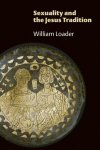
In Sexuality and the Jesus Tradition, William Loader examines passages dealing with sexuality in the gospels and other first-century literature. Loader explores perspectives on lust, marriage and divorce, and celibacy. Loader shows how, despite the passing of 2,000 years and massive social change, these ancient texts contain common issues that we still grapple with today.
Sexuality and the Jesus Tradition has a very fresh approach, which does not proceed only along the usual well-worn tracks associated with the subject matter. . . . A stimulating and challenging book, which deserves to be taken seriously.
William Loader is professor emeritus of New Testament at Murdoch University, Perth, Australia. In 2010, he completed a five-year Australian Research Council professional fellowship project: Attitudes towards Sexuality in Judaism and Christianity in the Hellenistic Greco-Roman Era. Loader is the author of numerous books, including Sexuality in the New Testament: Understanding the Key Texts
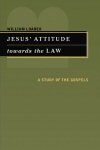
This book provides a critical reassessment and fresh analysis of Jesus’ attitude towards the Law as portrayed in each of the canonical gospels, Q, Thomas, and the apocryphal gospels. Representing William Loader’s definitive work on the subject, this comprehensive study helps readers gain a clearer picture of Jesus and his message.
William Loader is already well known among New Testament exegetes for his fine studies of Hebrews, the Gospel of John, and New Testament Christology. In this monumental work he surveys with skill the very difficult question of the way the Law is treated in the four canonical Gospels. The thoroughness of the survey is seen in the fact that separate chapters are devoted to the Law in the Q document and in noncanonical Gospels. This is indeed an impressive achievement and a most useful tool for New Testament scholars.
— John P. Meier, Catholic priest and professor of New Testament, University of Notre Dame
William Loader is professor emeritus of New Testament at Murdoch University in Perth, Australia. He is the author of numerous books including Philo, Josephus, and the Testaments on Sexuality, The Pseudepigrapha on Sexuality, The Dead Sea Scrolls on Sexuality, and Enoch, Levi, and Jubilees on Sexuality.
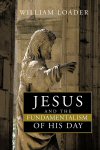
In Jesus and the Fundamentalism of His Day, Loader investigates each of the four Gospels, as well as the major streams of tradition that stand behind them. What emerges from this fascinating study is a diverse range of interpretations of Jesus. Mark depicts a Jesus prepared to jettison some parts of biblical law. Matthew and Luke, following “Q,” portray a Jesus who remained fully observant of the Torah and made his impact though the placement of emphasis. John, by contrast, has Jesus assume the qualities of divine law within himself, never disparaging its requirements though for him they are no longer in force. Loader sets these diverse pictures of Jesus side by side, highlighting both their similarities and their differences, and exploring the implications of his study for interpreting the Bible today.
William Loader has written the book we all need. In our time of rapid change he looks back to Jesus and the Gospel traditions to find guidance for our approach to Scripture. How did Jesus assess the traditions he received? How did his earliest interpreters? Loader’s study points the way forward for all who have a passion for the givenness of our Christian past and the exhilarating experience of the present.
— Francis J. Moloney, senior professorial fellow, Australian Catholic University
William Loader is professor emeritus of New Testament at Murdoch University in Perth, Australia. He is the author of numerous books including Philo, Josephus, and the Testaments on Sexuality, The Pseudepigrapha on Sexuality, The Dead Sea Scrolls on Sexuality, and Enoch, Levi, and Jubilees on Sexuality.
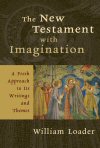
The dynamic teachings of the New Testament are often lost in the dryness and formality of academic study. In The New Testament with Imagination William Loader seeks to bridge this divide, bringing imagination into play in order to help readers enter the world of the New Testament more with more vibrancy. This book offers a unique way of approaching the New Testament, as Loader uses creative storytelling to make it come alive. Accessible to a broad readership, it will also give long-time students of Scripture a fresh perspective. Loader’s historically sound methodology focuses on imagining what we know about the New Testament through established research, not fanciful reconstruction.
This book is a delightful exercise in reimagining the New Testament by creative storytelling about Jesus, Paul, and the early Christians. It engages discussion of key texts, sometimes difficult ones, in new ways for the general reader who wants to know more about the New Testament without intimidation by scholarly apparatus. Yet the solid foundation it provides will serve well for personal reading or Bible study groups.
— Carolyn Osiek, professor of New Testament, Brite Divinity School
William Loader is professor emeritus of New Testament at Murdoch University in Perth, Australia. He has written numerous other books including Philo, Josephus, and the Testaments on Sexuality, The Pseudepigrapha on Sexuality, The Dead Sea Scrolls on Sexuality, and Enoch, Levi, and Jubilees on Sexuality.
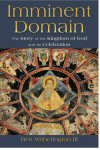
What is the kingdom of God? Where is it? How should the church celebrate the coming of the kingdom? In this popularl level study Ben Witherington addresses these and various other questions about the ever-elusive kingdom of God. Clearly defining the kingdom in terms of God’s dominion, Witherington discusses both its present (“already”) and future (“not yet”) dimensions, and he brings out at length the implications of kingdom thinking for theology, ethics, and worship. Filled with practical wisdom on the kingdom of God and how to celebrate it faithfully, Imminent Domain consists of six short chapters, each of which ends with several questions for reflection and discussion, making the book ideal for church classes and study groups.
Ben Witherington is Amos Professor of New Testament for Doctoral Studies at Asbury Theological Seminary, Wilmore, Kentucky, and is on the doctoral faculty at St. Andrews University, Scotland. Witherington has twice won the Christianity Today best biblical studies book of the year award, and his many books include socio-rhetorical commentaries on Mark, Acts, Romans, 1 and 2 Corinthians, Galatians, Philemon, Colossians, Ephesians, and 1 and 2 Thessalonians.
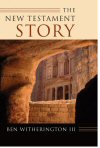
This informative, clearly written book introduces the New Testament in two ways. First, it explains where the New Testament came from, and two it examines the New Testament writings themselves. Ben Witherington first tells how and why the New Testament documents were written and collected and how they came to be known as the New Testament that we have today. He then discusses the main stories and major figures in the New Testament. Witherington looks particularly at the Gospels, examining how and why their stories differ and pointing out what these ancient biographies actually say about Jesus. He also surveys the ways that these stories were told and retold, explaining how this literary development has influenced Christian theology, ethics, and social thought. At once scholarly and accessible—it really is written in plain English—Witherington’s guide to the origins and message of the New Testament is eminently suitable as a text for college and seminary students. Each chapter is followed by a section of exercises and questions for study and reflection. The New Testament Story will also prove valuable to individual readers and ideal for church classes and group Bible studies.
The New Testament is a collection of a wide variety of stories. Ben Witherington is a sure guide through this library of stories and how they were collected. His book is a fresh take on introducing the New Testament. It comes highly recommended for its treatment of the wealth of testimony to the story.
—Darrell L. Bock, professor of New Testament, Dallas Theological Seminary
Ben Witherington is Amos Professor of New Testament for Doctoral Studies at Asbury Theological Seminary, Wilmore, Kentucky, and is on the doctoral faculty at St. Andrews University, Scotland. Witherington has twice won the Christianity Today best biblical studies book of the year award, and his many books include socio-rhetorical commentaries on Mark, Acts, Romans, 1 and 2 Corinthians, Galatians, Philemon, Colossians, Ephesians, and 1 and 2 Thessalonians.

When was the last time you heard a sermon on the theological importance of play? What do rest, eating, studying—and sex—have to do with the kingdom of God? Strangely, although these activities together take up much of our time, they seldom receive much discussion from a biblical point of view. In The Rest of Life Ben Witherington explores these subjects in the light of biblical teaching about the kingdom of God and the Christian hope for the future. He shows why and how all the normal activities of life should be done to the glory of God and for the edification of others. Focusing as it does on practical, everyday matters in an accessible style, this topical study is ideal for both individual reading and small-group discussion.
This latest creation of Ben Witherington is a delicious blend of research in Scripture and conversations with theological partners. Witherington makes a unique contribution to the biblical understanding of everyday themes by rooting his discussion in the kingdom of God. He gives us bifocal lenses so we can look at life both close-up, as it is now, and as it will become in the fullness of God’s lovely reign. This is an invigorating book, a delight to read.
—R. Paul Stevens
Ben Witherington is Amos Professor of New Testament for Doctoral Studies at Asbury Theological Seminary, Wilmore, Kentucky, and is on the doctoral faculty at St. Andrews University, Scotland. Witherington has twice won the Christianity Today best biblical studies book of the year award, and his many books include socio-rhetorical commentaries on Mark, Acts, Romans, 1 and 2 Corinthians, Galatians, Philemon, Colossians, Ephesians, and 1 and 2 Thessalonians.
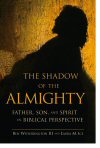
The Shadow of the Almighty introduces readers to the nature of God by exploring the biblical references to God as “Father,” “Son,” and “Holy Spirit.” This fruitful approach offers fresh insight into the meaning of the biblical language used for God, giving readers the background necessary for properly understanding the trinitarian perspective of the New Testament and of the Christian faith. Divided into four chapters, the book looks at “Father" language in early Judaism, at “Father” language in early Christianity, at “Son” language, and at language designating the Spirit. This thorough review of the traditional God language across the biblical texts shows what the earliest Christians understood by using these terms and, ultimately, what these terms mean for modern faith and practice.
While much of this material is deceptively familiar, the authors’ close examination of how and where the different terms are used reveals some surprising results. It makes clear, for example, that speaking of God in trinitarian terms was not as radical a departure from early Jewish monotheism as many have thought, and it shows that while early Christianity was characterized by disparate ideas, the first Christians nevertheless shared a common understanding of God. Equally engaging findings of the book include the authors’ support for the traditional gendered term “Father” when speaking about God. Complete with helpful questions at the end of each chapter, The Shadow of the Almighty provides an excellent place to begin a deeper study of God.
An excellent introduction to the nature of God and the Godhead in Scripture.
—Lee Hardy
Ben Witherington is Amos Professor of New Testament for Doctoral Studies at Asbury Theological Seminary, Wilmore, Kentucky, and is on the doctoral faculty at St. Andrews University, Scotland. Witherington has twice won the Christianity Today best biblical studies book of the year award, and his many books include socio-rhetorical commentaries on Mark, Acts, Romans, 1 and 2 Corinthians, Galatians, Philemon, Colossians, Ephesians, and 1 and 2 Thessalonians.
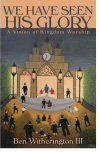
We Have Seen His Glory sounds a clarion call to worship in light of the coming kingdom. Ben Witherington here contends that Christian worship cannot be a matter of merely continuing ancient practices; instead, we must be preparing for worship in the kingdom of God when it comes on earth. The eight chapters in this thought-provoking book each end with questions for reflection and discussion—ideal fare for church study groups.
A solid meditation on the theocentric focus that is at the core of worship. Worship is about God and for God, touching the whole of our lives. Witherington’s book is really a series of biblical reflections on this theme. Read, enjoy, and then take a moment to delight in the God Witherington draws us to behold.
—Darrell L. Bock, professor of New Testament, Dallas Theological Seminary
Ben Witherington is Amos Professor of New Testament for Doctoral Studies at Asbury Theological Seminary, Wilmore, Kentucky, and is on the doctoral faculty at St. Andrews University, Scotland. Witherington has twice won the Christianity Today best biblical studies book of the year award, and his many books include socio-rhetorical commentaries on Mark, Acts, Romans, 1 and 2 Corinthians, Galatians, Philemon, Colossians, Ephesians, and 1 and 2 Thessalonians.
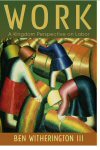
Most Christians spend most of their waking hours working, yet many regard work as at best a necessary evil—just one more unfortunate by-product of humanity’s fall from grace. Not so, says Ben Witherington, and in Work: A Kingdom Perspective on Labor, he considers work as neither the curse nor the cure of human life but, rather, as something good that God has given us to do. In this brief primer on the biblical theology and ethics of work, Witherington carefully unpacks the concept of work, considering its relationship to rest, play, worship, the normal cycle of human life, and the coming kingdom of God. Work as calling, work as ministry, work as a way to make a living, and the notably unbiblical notion of retirement—Witherington’s Work engages these subjects and more, combining scholarly acumen with good humor, common sense, cultural awareness, and biblically based insights from Genesis to Revelation.
Conducting a critical dialogue with the theological voices of our day, drawing upon the wisdom of the Christian tradition, and offering a sensitive reading of New Testament parables, Witherington delivers sound counsel on the kingdom meaning of work and its implications for our lives today.
—Lee Hardy, professor of philosophy, Calvin College
Ben Witherington is Amos Professor of New Testament for Doctoral Studies at Asbury Theological Seminary, Wilmore, Kentucky, and is on the doctoral faculty at St. Andrews University, Scotland. Witherington has twice won the Christianity Today best biblical studies book of the year award, and his many books include socio-rhetorical commentaries on Mark, Acts, Romans, 1 and 2 Corinthians, Galatians, Philemon, Colossians, Ephesians, and 1 and 2 Thessalonians.
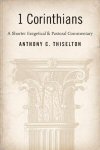
Anthony Thiselton’s lengthy New International Greek Testament Commentary volume The First Epistle to the Corinthians has become a standard work on 1 Corinthians. In this “shorter” commentary, Thiselton draws on his excellent exegesis from that volume but combines it afresh with keen practical and pastoral application for readers at all levels.
Thiselton delves deeply into the context and text of Paul’s first Corinthian letter as he suggests, section by section, how the book applies to pastoral and practical issues. He draws vivid parallels between the growing church in Corinth and the twenty-first-century church, demonstrating that today’s church also faces a seductive culture of competition and consumerism. The church in Corinth preferred its self-centered theology to the Christ-centered gospel of the wider apostolic church. Paul’s response in 1 Corinthians, amplified by Thiselton’s commentary, becomes a living, practical, transforming word from God for Christians today.
Lucidly, accessibly, and engagingly, Thiselton brings alive the subject matter about which St. Paul writes. Thus, this commentary searchingly illuminates the nature of Christian lifestyle and spirituality today.
—Walter Moberly, professor of theology and religion, Durham University
Anthony Thiselton is professor emeritus of Christian theology at the University of Nottingham, England.
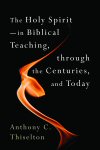
This book by eminent scholar Anthony Thiselton is a detailed biblical, historical, and contemporary study of the Holy Spirit. Thiselton presents an up-to-date account of biblical teaching on the topic, including exposition of passages and hermeneutics; offers a comprehensive historical survey from the Apostolic Fathers to Jonathan Edwards; and engages a host of modern theologians.
Thiselton closes by discussing a remarkably wide range of writings on the Holy Spirit from the nineteenth century to the present day. He interacts with Pentecostals and the Renewal Movement in a positive, yet critical manner. The book as a whole is at once scholarly and readable, comprehensive and practical.
Respectfully engages a wide range of literature. Even cessationists and classical Pentecostals, who will argue with various elements, will find numerous points valuable for reflection and exegesis. All will appreciate and profit from the helpful engagement with secondary literature and survey of historical perspectives.
—Craig S. Keener, professor of New Testament, Asbury Theological Seminary
Anthony C. Thiselton is professor emeritus of Christian theology at the University of Nottingham, England.
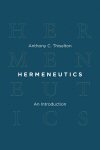
Anthony Thiselton here brings together his encyclopedic knowledge of hermeneutics and his nearly four decades of teaching on the subject to provide a splendid interdisciplinary textbook. After a thorough historical overview of hermeneutics, Thiselton moves into modern times with extensive analysis of scholarship from the mid-twentieth century, including liberation and feminist theologies, reader-response and reception theory, and postmodernism. No other text on hermeneutics covers the range of writers and subjects discussed in Thiselton’s Hermeneutics.
This is that rare book that is simply a pleasure to read. An ideal textbook, it is provocative, wise, astonishingly informed, and scrupulously evenhanded in its handling of material. Elephants may swim here and children may safely paddle. It is truly Tony Thiselton’s legacy and the uncluttered distillation of a lifetime’s study of hermeneutics. I cannot praise this book sufficiently highly.
—Iain Torrance, president, Princeton Theological Seminary
Anthony Thiselton is professor emeritus of Christian theology at the University of Nottingham, England.
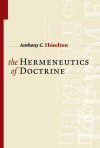
Drawing on the resources of contemporary hermeneutical theory, Anthony Thiselton in this volume masterfully recovers the formative and transformative power of Christian doctrine.
The past 35 years have witnessed major steps forward in the use of hermeneutics in biblical studies, but never before has hermeneutics made a comparable impact on the formulation of doctrine and our engagement with it. Indeed, no other book explores the interface between hermeneutics and Christian doctrine in the same in-depth way that this one does. Throughout the book Thiselton shows how perspectives that arise from hermeneutics shed fresh light on theological method, reshape horizons of understanding, and reveal the relevance of doctrine for formation and for life.
Arguably the leading authority worldwide on biblical and philosophical hermeneutics, Thiselton has written widely acclaimed works in the areas of biblical studies and philosophical theology. His probing interaction in The Hermeneutics of Doctrine with numerous other great thinkers—Gadamer, Ricoeur, Lindbeck, Balthasar,Vanhoozer, Pannenberg—and his original perspectives will make this volume a valuable resource for scholars and advanced students.
All the adjectives have already been used up in praise of Tony Thiselton’s previous volumes: magisterial, comprehensive, mind-blowing, worldview-changing, challenging yet comprehensible, massively learned and massively relevant, deeply faithful to the Christian tradition yet deeply refreshing in seeing everything from new angles. This new book is vintage Thiselton.
—N.T. Wright, professor of New Testament and early Christianity, St. Andrews University
Anthony Thiselton is professor emeritus of Christian theology at the University of Nottingham, England.
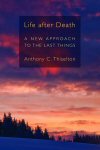
Writing in the wake of a near-fatal stroke, eminent theologian Anthony C. Thiselton addresses a universally significant topic: death and what comes next. This distinctive study of “the last things” comprehensively explores questions about individual death, the intermediate state, the return of Christ, the resurrection of the dead, hell, the final state of the redeemed, and more. At once scholarly and pastoral, Thiselton’s Life after Death offers biblically astute, historically informed, and intellectually sound answers—making this book an invaluable resource for thinking Christians.
Very accessible, deeply grounded in Scripture, pastorally helpful, and sensitive to that most democratic of all institutions—death. What a real gem of a book.
—John Sentamu, archbishop of York
Anthony Thiselton is professor emeritus of Christian theology at the University of Nottingham, England.

In The Promise of Hermeneutics, authors Roger Lundin, Clarence Walhout, and Anthony C. Thiselton seek to counter certain assumptions about interpretation both within the church and in the larger culture and academic community. The quest for validity and certainty can obscure the nuanced complexity of the interpretive act, and here the authors have sought to establish a balance between application of method and emphasis on indeterminacy. This work proposes that through this balanced approach the role of wisdom and a useful understanding of hermeneutics can lead to interpretations based on valid context and due constraint.
Among the plethora of books published every year on the subject of hermeneutics, this volume stands out. This book covers the subject comprehensively, in reasonable compass, and yet with penetration and up-to-date alertness. Even those who read widely on the subject will be informed; students who read this book carefully will receive an education not only in hermeneutics in some narrow sense but also in epistemology and the shape of postmodern thought.
—D. A. Carson, Trinity Evangelical Divinity School
Anthony Thiselton is professor emeritus of Christian theology at the University of Nottingham, England.
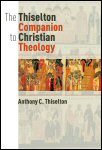
Covering everything from “Abba” to “Zwingli,” The Thiselton Companion to Christian Theology is a comprehensive account of a wide sweep of topics and thinkers in Christian theology. Written entirely by eminent scholar Anthony Thiselton, the book features a coherence lacking in most multiauthored volumes.
Drawing on his encyclopedic knowledge, gained from more than 50 years of study and teaching, Thiselton provides some 600 articles on various aspects of theology throughout the centuries. The entries comprise both short descriptive surveys and longer essays of original assessment on central theological topics—such as atonement, Christology, God, and Holy Spirit—and on such theologians as Aquinas, Augustine, Barth, Calvin, Küng, Luther, Moltmann, and Pannenberg. The book also includes a helpful time chart dating all of the theologians discussed and highlighting key events in Christian history.
There are not many people whose opinion about every theological thing under the sun I would want to seek out; Anthony Thiselton is on that short list.
—Kevin J. Vanhoozer, professor of systematic theology, Trinity Evangelical Divinity School
Anthony C. Thiselton is professor emeritus of Christian theology at the University of Nottingham, England. He is the author of The First Epistle to the Corinthians, The Living Paul: An Introduction to the Apostle’s Life and Thought, and The Holy Spirit—In Biblical Teaching, through the Centuries, and Today.

When the ancients talked about "messiah", what did they picture? Did that term refer to a stately figure who would rule, to a militant who would rescue, or to a variety of roles held by many? While Christians have traditionally equated the word "messiah" with Jesus, the discussion is far more complex. This volume contributes significantly to that discussion.
Ten expert scholars here address questions surrounding the concept of "messiah" and clarify what it means to call Jesus "messiah." The book comprises two main parts, first treating those writers who preceded or surrounded the New Testament (two essays on the Old Testament and two on extrabiblical literature) and then discussing the writers of the New Testament. Concluding the volume is a critical response by Craig Evans to both sections. This volume will be helpful to pastors and laypersons wanting to explore the nature and identity of the Messiah in the Old and New Testaments in order to better understand Jesus as Messiah.
Overall, this collection of papers is a helpful introduction to the messianism of the New Testament. The essays by Porter, Thatcher, and Cummins were particularly helpful expositions of the Christologies of the New Testament and how they focused on Jesus as Messiah.
—Michael F. Bird
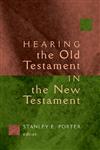
How does the New Testament echo the Old? Which versions of the Hebrew Scriptures were authoritative for New Testament writers? The appearance of concepts, images, and passages from the Old Testament in the books of the New raises important questions about textual versions, allusions, and the differences between ancient and modern meaning.
Written by ten distinguished scholars, Hearing the Old Testament in the New Testament first lays out significant foundational issues and then systematically investigates the use of the Old in the New Testament. In a culminating essay Andreas Köstenberger both questions and affirms the other contributors’ findings. These essays together will reward a wide range of New Testament readers with a wealth of insights.
The editor is to be praised for gathering such a fine set of authors. The book offers an excellent survey of the use of the Old Testament in the New, clarifying methods, summarizing results, and indicating where further research is required. It is destined to become a major textbook in the field.
—Steve Moyise
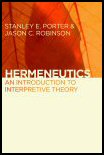
We have needed a book like this for some time. It not only traces the philosophical issues and major figures but does so concisely and readably. This is a must-read for college and seminary classes as well as for anyone who wants to be grounded in the theoretical issues behind the process of interpreting texts.
—Grant Osborne, professor of New Testament, Trinity Evangelical Divinity School
Stanley Porter is president, dean, and professor of New Testament at McMaster Divinity College in Hamilton, Ontario.
Jason Robinsonis assistant professor in contemporary studies at Wilfrid Laurier University in Brantford, Ontario, and coeditor of Philosophical Apprenticeships: Contemporary Continental Philosophy in Canada.
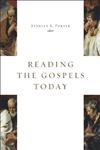
As ancient documents, the New Testament Gospels can seem distant from contemporary life or irrelevant to modern society. Further complicating the task of reading the Gospels is the way they seem to introduce differing, if not competing, pictures of Jesus. Reading the Gospels Today is meant to help Bible readers understand—and move beyond—the difficulties involved in interpreting Scripture in our current context.
In these insightful studies several biblical scholars explore the content of the Gospels while also discussing how to read these writings in relation to each other and in terms of today’s world. Some chapters consider issues that vex Gospel criticism; others look at particular texts or Synoptic themes; still others demonstrate how one’s immediate interpretive context helps to raise the issues and shape the answers that are found when we read the Gospels. Well organized, thoughtfully written, and widely accessible, this volume will serve to draw readers into the exciting field of contemporary Gospels study.
These eight writers each bring a measure of common sense to a field sometimes plagued by technical jargon and faddism. Their no-nonsense approach should make this book a valuable supplementary text for beginning or advanced students of the Gospels in colleges and seminaries.
Stanley Porter is president, dean, and professor of New Testament at McMaster Divinity College in Hamilton, Ontario.
Jason Robinsonis assistant professor in contemporary studies at Wilfrid Laurier University in Brantford, Ontario, and coeditor of Philosophical Apprenticeships: Contemporary Continental Philosophy in Canada.
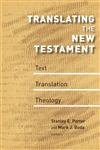
Stanley Porter and Mark Boda here bring together a group of respected theologians to provide an up-to-date assessment of translation of the New Testament in terms of textual criticism, translation theory, and theology. Each section includes theoretical essays on the interface of a given area with particular issues in translation, followed by applications of the theory to a common passage — the story of the rich man and Lazarus found in Luke 16:19-31. Advocates of different positions note the translational implications that follow from choosing a particular textual tradition or type over another. These differing perspectives allow for both theoretical diversity and concrete differences in the practice of translation.
Stanley Porter is president, dean, and professor of New Testament at McMaster Divinity College in Hamilton, Ontario.
Jason Robinsonis assistant professor in contemporary studies at Wilfrid Laurier University in Brantford, Ontario, and coeditor of Philosophical Apprenticeships: Contemporary Continental Philosophy in Canada.
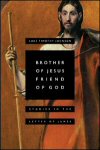
Brother of Jesus, Friend of God: Studies in the Letter of James
- Author: Luke Timothy Johnson
- Publisher: Eerdmans
- Publication Date: 2004
- Pages: 299
The letter of James has enjoyed a colorful history, with its background and significance widely debated over the centuries. In this book, an outstanding scholar of the New Testament offers new and selected studies of James that show its roots in antiquity and its importance for Christian history and theology.
Luke Timothy Johnson explores the letter of James from a variety of perspectives. After a general introduction to James, he looks at its history of interpretation. Johnson then examines James’s social and historical situation, its place within Scripture, and its use of the sayings of Jesus. Several exegetical studies take care to place James in the context of Hellenistic moral discourse. Two concluding essays look at the themes of friendship and gender in James.
Johnson’s Brother of Jesus, Friend of God is accessible to general readers serious about Bible study, and church groups will find this volume to be a fruitful entry into an important portion of the New Testament.
Luke Timothy Johnson
is the R.W. Woodruff Professor of New Testament and Christian Origins at the Candler School of Theology at Emory University in Atlanta, Georgia. Johnson earned his BA in philosophy from Notre Dame Seminary in New Orleans, an MDiv in theology from Saint Meinrad School of Theology, an MA in religious studies from Indiana University, and a PhD in New Testament studies from Yale University.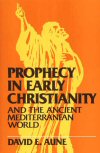
Comparable in scope to Johannes Lindblom’s Prophecy in Ancient Israel, this book offers the first comprehensive treatment in English of the place of prophecy in the New Testament period.
Because early Christianity was the product of Western as well as Eastern religious and cultural traditions, David Aune begins by examining the antecedents of early Christian prophecy. He describes Greco-Roman prophecy—the types of oracles, the people who prophesied, the procedures, and the purpose of prophecy. In examining Israelite-Jewish prophecy, Aune discusses the Old Testament prophets, first-century apocalyptic literature, eschatological prophecy, John the Baptist, and Qumran.
Having thus set the background in detail, Aune examines the character of early Christian prophecy, discussing the early Christian and modern conceptions of Jesus as prophet, and analyzing every known Christian prophetic speech from Paul to the middle of the second century AD.
Aune attributes the eventual decline of prophecy to the institutionalization of Christianity, in which the functions of teachers, pastors, elders, and deacons replaced the essentially similar functions of prophets.
This very important study of early Christian life will enlighten anyone who reads it. It is a major contribution to the whole early Christian world, based on sound learning and written to be read.
—Robert M. Grant, University of Chicago
David E. Aune is Walter Professor of New Testament & Christian Origins at the University of Notre Dame.
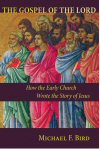
The Gospel of the Lord: How the Early Church Wrote the Story of Jesus
- Author: Michael F. Bird
- Publisher: Eerdmans
- Publication Date: 2014
- Pages: 736
In this book, through a distinctive evangelical and critical approach, Michael Bird explores the historical development of the four canonical Gospels. He shows how the memories and faith of the earliest believers formed the Gospel accounts of Jesus that got written and, in turn, how these accounts further shaped the early church.
Bird’s study clarifies the often confusing debates over the origins of the canonical Gospels. Bird navigates recent concerns and research as he builds an informed case for how the early Christ followers wrote and spread the story of Jesus—the story by which they believed they were called to live. The Gospel of the Lord is ideal for students or anyone who wants to know the story behind the four Gospels.
A balanced, comprehensive survey of the critical questions involved in studying the four Gospels.
Studying the Gospels is daunting for the beginner and difficult even for the seasoned scholar. Mike Bird here slices a path through the tangled mess of older hypotheses and offers clear guidelines for the way forward. . . . Everyone will profit enormously from wrestling with the issues presented here in a fresh and compelling manner.
—N.T. Wright, professor of New Testament and early Christianity, St. Andrews University
Michael F. Bird is lecturer in theology at Ridley Melbourne Mission and Ministry College in Australia. His previous books include Evangelical Theology: A Biblical and Systematic Introduction, Jesus Is the Christ: The Messianic Testimony of the Gospels, and Are You the One Who Is to Come? The Historical Jesus and the Messianic Question.
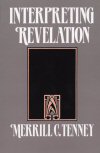
For centuries the book of Revelation has been both an inspiration and a mystery to the Christian church. In hours of darkness it has given courage to its readers; but in periods of ease and prosperity it has become the subject of a bewildering assortment of approaches and interpretations.
Merrill C. Tenney has built his study on the thesis that Revelation had a definite message for those to whom it was first written, a meaning they could comprehend because they understood the structure, imagery, and contemporary allusions in the text in ways lost to modern readers.
Tenney’s Interpreting Revelation attempts to recover how the book as a whole would have spoken to the ancient Christian world. In so doing, Tenney applies broad interpretive principles that will enable readers to think through the book for themselves and to formulate their own conclusions.
Dr. Tenney has here succeeded again in condensing a great deal of learning into a relatively small compass. He is able to present difficult and complicated issues in a simple and intelligent manner, and with all fairness to his predecessors, to chart his own original approach to the problem.
—Otto A. Piper, Theology Today
Merril C. Tenney (1904–1985) was dean of the graduate school and professor of Bible and theology at Wheaton College in Illinois.
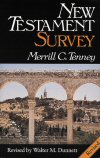
First published in 1953 and revised in 1961, Merrill Tenney’s comprehensive survey has served to introduce the general reader, student, and teacher to the world and message of the New Testament.
Written in a clear, nontechnical style, New Testament Survey begins with a survey of the social, political, economic, and religious background of the New Testament, and then goes on to examine the various groups of New Testament books, which are considered in their historical settings. The book concludes with a penetrating study of the New Testament canon.
Undertaken at the request of Dr. Tenney, and prepared with his full approval, this 1985 revision by Walter M. Dunnett includes an entirely new chapter on the Jewish background of the New Testament, plus several new short sections, including materials on the Gospels and the canon of the New Testament. The bibliography has been enlarged and updated, and many of the book’s numerous illustrations, maps, and charts are new. Great care has been exercised to retain the spirit and quality of the original work, ensuring that the book will remain a standard in the years to come.
Merril C. Tenney (1904–1985) was dean of the graduate school and professor of Bible and theology at Wheaton College in Illinois.

John: The Gospel of Belief
- Author: Merrill C. Tenney
- Publisher: Eerdmans
- Publication Date: 1997
- Pages: 321
Merrill Tenney, one of the original team members for the translation of the New American Standard Bible, gives us a brilliant guidebook to the study of the Gospel of John. Tenney's thoughtful analysis of the text includes linguistics studies, sentence diagrams, detailed outlines, historical accounts, maps, and charts of the chronology and geography of John's Gospel. A unique volume, it delves deeply into the structure of John, also providing verse-by-verse exegesis that will be useful to pastors, teachers, biblical scholars, and all wanting a holistic understanding of the book of John.
Merril C. Tenney (1904–1985) was dean of the graduate school and professor of Bible and theology at Wheaton College in Illinois.
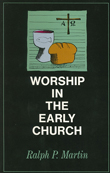
Worship in the Early Church
- Author: Ralph P. Martin
- Publisher: Eerdmans
- Publication Date: 1974
- Pages: 144
Worship in the Early Church sheds light on how the earliest Christians worshiped God, including several elements into their worship that reflected their Jewish heritage. Prayers and praises, singing, creeds and confessions, preaching, offerings, and sacrament—these are the chief features of early Christian worship examined by Professor Martin. Pastors, ministers, Sunday school teachers and laypersons will benefit from this lucid account of why believers do what they do when they gather together to worship.
Ralph Martin was a professor of New Testament at Fuller Theological Seminary and is now a distinguished scholar in residence. He holds a PhD from the University of London and is the author of numerous books and articles about the New Testament, including The Worship of God and Reconciliation: A Study of Paul’s Theology. He has served as New Testament editor for the Word Biblical Commentary Series and has edited the Dictionary of Paul and His Letters.
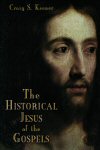
The earliest substantive sources available for historical Jesus research are in the Gospels themselves; when interpreted in their early Jewish setting, their picture of Jesus is more coherent and plausible than are the competing theories offered by many modern scholars. So argues Craig Keener in The Historical Jesus of the Gospels.
In exploring the depth and riches of the material found in the Synoptic Gospels, Keener shows how many works on the historical Jesus emphasize just one aspect of the Jesus tradition against others, but a much wider range of material in the Jesus tradition makes sense in an ancient Jewish setting. Keener masterfully uses a broad range of evidence from the early Jesus traditions and early Judaism to reconstruct a fuller portrait of the Jesus who lived in history.
With critical acumen, Craig Keener presents a comprehensive account of the study of the historical Jesus. It will be a boon for all readers—inquisitive laypeople, pastors, students of the Gospels, and biblical colleagues.
—Joseph A. Fitzmyer, emeritus professor of New Testament, Catholic University of America
Craig S. Keener is professor of New Testament at Asbury Theological Seminary, Wilmore, Kentucky. He is the author of many other books, including The Gospel of Matthew: A Socio-Rhetorical Commentary and The Gospel of John: A Commentary (two volumes). Three of his books have won awards and together have sold over half a million copies.
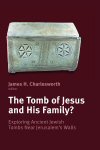
The Tomb of Jesus and His Family?: Exploring Ancient Jewish Tombs near Jerusalem’s Walls
- Editor: James H. Charlesworth
- Publisher: Eerdmans
- Publication Date: 2013
- Pages: 605
About 25 years ago archaeologists discovered a tomb near Jerusalem that contained a family’s ossuaries—limestone bone boxes commonly used in ancient Near Eastern burial customs—inscribed with some familiar New Testament names: Mary, Joseph, James, Mary Magdalene, and Jesus. Intrest arose amongst the public and specialists alike, and in January 2008 an international congress of scholars met in Jerusalem to discuss this issue. This volume presents their findings. Covering the archaeological facts about this discovery, Jewish burial customs during the late Second Temple period, first-century inscriptions, the Talpiot tomb, the James ossuary, the Holy Sepulcher, Hazon Gabriel, and beliefs about burial and the afterlife within Second Temple Judaism, these essays offer expert perspectives on a much-publicized topic.
James H. Charlesworth is George L. Collord Professor of New Testament Language and Literature and director of the Dead Sea Scrolls project at Princeton Theological Seminary. He has authored or edited over 60 books.
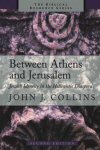
One of the most creative and consequential collisions in Western culture involved the encounter of Judaism with Hellenism. In this widely acclaimed study of the Jews who lived in Hellenistic Egypt, “between Athens and Jerusalem,” John J. Collins examines the literature of Hellenistic Judaism, treating not only the introductory questions of date, authorship, and provenance but also the larger question of Jewish identity in the Graeco-Roman world. First published in 1984, this landmark study by one of the world’s leading experts in Hellenistic Judaism is now fully revised and updated to take into account the best of recent scholarship.
Scholars and students who have benefited immensely from this work will. . . be delighted to see it re-emerge in a second edition. . . . Collins’s mastery of the range of material treated in this book is awesome, and his close engagement with these Diaspora texts and their cultural meaning is a model for all. Minor Diaspora authors who have long been neglected, or even generally unknown, are here again brought to the attention of the scholarly world in a way that should ensure their recognition in future debates about Second Temple Judaism. . . . Students and scholars will be immensely grateful for this guide, which will play a central role in future discussion of the Diaspora.
—Martin Goodman in Journal of Jewish Studies
John J. Collins is Holmes professor of Old Testament Criticism and Interpretation at Yale Divinity School and has served as president of both the Society of Biblical Literature and the Catholic Biblical Association. His many books include Beyond the Qumran Community, King and Messiah as Son of God, The Bible after Babel, and The Apocalyptic Imagination.
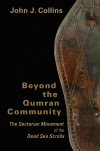
The full publication of the Dead Sea Scrolls necessitates fresh analysis, and Beyond the Qumran Community does just that. In this text, John J. Collins reaches a surprising conclusion: the sect described in the Dead Sea Scrolls developed later than usually supposed and was never confined to the site of Qumran. Collins deconstructs the Qumran community and shows that the sectarian documents actually come from a text spread throughout the land. He first examines the Community Rule (Yahad), and then considers the Teacher of Righteousness, a pivotal figure in the Essene movement. Collins argues that he was probably active in the first century BC rather than in the Maccabean era. After examining the available evidence, Collins concludes that it is overwhelmingly likely that the site of Qumran housed merely a single settlement of a widespread movement.
Well known and deeply respected for his work in the Dead Sea Scrolls, John Collins has written another great book that breaks new ground and advances the discussion of the Essenes and the Qumran community in many important ways. Displaying mastery of the primary and secondary literatures, Beyond the Qumran Community gives the sometimes contentious debate a balanced and nuanced perspective. It is a wonderful achievement and must reading for all who are interested in the Scrolls and the Jewish people at the turn of the era.
John J. Collins is Holmes Professor of Old Testament Criticism and Interpretation at Yale Divinity School and has served as president of both the Society of Biblical Literature and the Catholic Biblical Association. His many books include Beyond the Qumran Community, King and Messiah as Son of God, The Bible after Babel, and The Apocalyptic Imagination.
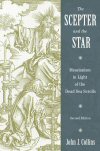
In The Scepter and the Star John J. Collins offers an up-to-date review of Jewish messianic expectations around the time of Jesus, in light of the Dead Sea Scrolls. Collins breaks these expectations into three categories: Davidic, priestly, and prophetic. Based on a small number of prophetic oracles and reflected in the various titles and names assigned to the messiah, the Davidic model holds a clear expectation that the messiah figure would play a militant role. In sectarian circles, the priestly model was far more prominent. Jesus of Nazareth, however, showed more resemblance to the prophetic messiah during his historical career, identified as the Davidic “Son of Man” primarily after his death.
A must-read for anyone interested in the early history of Judaism and the development of nascent Christianity.
—Lawrence H. Schiffman, New York University
John J. Collins is Holmes Professor of Old Testament Criticism and Interpretation at Yale Divinity School and has served as president of both the Society of Biblical Literature and the Catholic Biblical Association. His many books include Beyond the Qumran Community, King and Messiah as Son of God, The Bible after Babel, and The Apocalyptic Imagination.
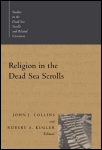
The Dead Sea Scrolls have profoundly changed the way we think about the Bible. But what is the religion found in the Scrolls themselves? This book provides a much-needed assessment of several major aspects of the religion of the Dead Sea Scrolls in light of recent publications. Eight leading experts explore the concept of divinity in the Scrolls, the Scrolls’ relation to important halakic issues, the question of Hellenistic influence in the Scrolls, and the apocalypticism and messianism specific to the Scrolls.
John J. Collins is Holmes professor of Old Testament Criticism and Interpretation at Yale Divinity School and has served as president of both the Society of Biblical Literature and the Catholic Biblical Association.
Robert Kugler is Paul S. Wright Professor of Christian Studies at Lewis & Clark College, Portland, Oregon.
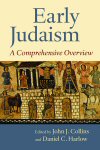
Culled from The Eerdmans Dictionary of Early Judaism, a monumental, groundbreaking reference work published in late 2010, Early Judaism: A Comprehensive Overview contains 15 first-rate essays from a diverse group of internationally renowned scholars. This volume provides the most comprehensive and authoritative overview available of Judaism in the Hellenistic and early Roman periods.
John J. Collins is Holmes Professor of Old Testament Criticism and Interpretation at Yale Divinity School and has served as president of both the Society of Biblical Literature and the Catholic Biblical Association. His many books include Beyond the Qumran Community, King and Messiah as Son of God, The Bible after Babel, and The Apocalyptic Imagination.
Daniel C. Harlow is professor of biblical, early Jewish, and early Christian studies at Calvin College.

Biblical scholars today often sound as if they are caught in the aftermath of Babel—a clamor of voices unable to reach common agreement. Yet is this confusion necessarily a bad thing? Many postmodern critics see the recent profusion of critical approaches as a welcome opportunity for the emergence of diverse new techniques. In The Bible after Babel, noted biblical scholar John J. Collins considers the effect of the postmodern situation on biblical, primarily Old Testament, criticism over the last three decades. Engaging and even-handed, Collins examines the quest of historical criticism to objectively establish a text’s basic meaning. Accepting that the Bible may no longer provide secure “foundations” for faith, Collins still highlights its ethical challenge to be concerned for “the other”—a challenge central both to Old Testament ethics and to the teaching of Jesus.
John J. Collins shows here again his extraordinary ability as an exegete and a sympathetic critic of modern trends in biblical study. . . . As a wise guide to trends in modern biblical scholarship, The Bible after Babel manages to recognize both the strengths and the weaknesses of liberationist and related interpretative approaches. Collins succeeds in offering ways of detecting ‘a still small voice’ of challenge, insight, and great worth in the midst of the welter of contemporary debate about the Bible. A masterly book.
—Christopher Rowland, Dean Ireland’s Professor of the Exegesis of Holy Scripture, University of Oxford
John J. Collins is Holmes Professor of Old Testament Criticism and Interpretation at Yale Divinity School. He has served as president of both the Society of Biblical Literature and the Catholic Biblical Association. His many books include Beyond the Qumran Community, King and Messiah as Son of God, and The Apocalyptic Imagination.

King and Messiah as Son of God
- Authors: Adela Yarbro Collins, John J. Collins
- Publisher: Eerdmans
- Publication Date: 2008
- Pages: 275
This volume traces the history of the idea that the king—and later the messiah—is Son of God, from its origins in ancient Near Eastern royal ideology to its Christian appropriation in the New Testament.
Both highly regarded scholars, Adela Yarbro Collins and John J. Collins argue that Jesus was called “the Son of God” precisely because he was believed to be the messianic king. This belief and tradition, they contend, led to the identification of Jesus as pre-existent, personified Wisdom, or a heavenly being in the New Testament canon. However, the titles Jesus is given are historical titles tracing back to Egyptian New Kingdom ideology. Therefore the title “Son of God” is likely solely messianic and not literal. King and Messiah as Son of God is distinctive in its range, spanning both Testaments and informed by ancient Near Eastern literature and Jewish noncanonical literature.
In the Logos edition, King and Messiah as Son of God is enhanced by amazing functionality. Scripture citations link directly to English translations, and important terms link to dictionaries, encyclopedias, and a wealth of other resources in your digital library. Powerful searches help you find exactly what you’re looking for. Take the discussion with you using tablet and mobile apps. With Logos Bible Software, the most efficient and comprehensive research tools are in one place, so you get the most out of your study.
About the Authors
John J. Collins is Holmes Professor of Old Testament Criticism and Interpretation at Yale Divinity School, and has served as president of both the Society of Biblical Literature and the Catholic Biblical Association. His many books include Beyond the Qumran Community, King and Messiah as Son of God, The Bible after Babel, and The Apocalyptic Imagination.
Adela Yarbro Collins is Buckingham Professor of New Testament Criticism and Interpretation at Yale University.
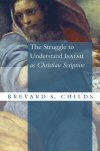
A key emphasis of Brevard Childs’ distinguished career has been to show not only that the canon of Scripture comprises both Old and New Testaments but also that the concept of “canon” includes the way the Christian church continues to wrestle in every age with the meaning of its sacred texts. In this new volume Childs uses the book of Isaiah as a case study of the church’ s endeavor throughout history to understand its Scriptures.
In each chapter Childs focuses on a different Christian age, using the work of key figures to illustrate the church’s changing views of Isaiah. After looking at the Septuagint translation, Childs examines commentaries and tractates from the patristic, Reformation, and modern periods. His review shows that despite an enormous diversity in time, culture, nationality, and audience, these works nevertheless display a “family resemblance” in their theological understandings of this central Old Testament text. Childs also reveals how the church struggled to adapt to changing social and historical conditions, often by correcting or refining traditional methodologies, while at the same time maintaining a theological stance measured by faithfulness to Jesus Christ. In an important final chapter Childs draws out some implications of his work for modern debates over the role of Scripture in the life of the church.
Of great value to scholars, ministers, and students, this book will also draw general readers into the exciting theological debate currently raging in the Christian church about the faithful interpretation of Scripture.
This is a magisterial volume—learned, exhaustive, accessible. Brevard Childs gets to the hermeneutical problem that is ours, in our ‘postmodern’ instincts, yet whose resolution will come only from attending carefully to the history of interpretation. It risks understatement to say that this book is a towering, timely, unparalleled contribution from a man who has single-handedly held the lantern showing us the way ahead in our difficult days, now by turning his attention to the crucial history of reception of the book of Isaiah. Brilliant and full of insight.
—Christopher Seitz, professor, Toronto School of Theology
Brevard S. Childs (1923–2007) was Sterling Professor Emeritus of Divinity at Yale Divinity School. Among his many books are Biblical Theology in Crisis, Introduction to the Old Testament as Scripture, The New Testament as Canon, Old Testament Theology in a Canonical Context, and Biblical Theology of the Old and New Testament.
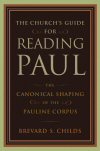
In The Church’s Guide for Reading Paul Brevard Childs turns his sharp scholarly eye to the works of the Apostle Paul and makes an unusual argument: the New Testament was canonically shaped, its formation a hermeneutical exercise in which its anonymous apostles and postapostolic editors collected, preserved, and theologically shaped the material in order for the evangelical traditions to serve successive generations of Christians.
Childs contends that within the New Testament the Pauline corpus stands as a unit bookended by Romans and the pastoral epistles. He assigns an introductory role to Romans, examining how it puts the contingencies of Paul’s earlier letters into context without sacrificing their particularity. At the other end, the pastoral epistles serve as a concluding valorization of Paul as the church’s doctrinal model. By considering Paul’s works as a whole, Childs offers a way to gain a fuller understanding of the individual letters.
This is vintage Childs. Who else among modern Old or New Testament scholars turns so easily to and converses so effortlessly with the other Testament and its critical scholarship? From whom else would we expect so arresting an analysis of the historical development and theological significance of ‘the canonical Paul’? It is as if Childs has hit the reset button on Pauline studies—sometimes resurrecting interpretive issues long neglected, sometimes casting contemporary discussion in fresh light, always pressing for renewed discussion of the role of the canon for reading the wider Pauline corpus in and for the church.
—Joel B. Green, professor of New Testament Interpretation, Fuller Theological Seminary
Brevard S. Childs (1923–2007) was Sterling Professor Emeritus of Divinity at Yale Divinity School. Among his many books are Biblical Theology in Crisis, Introduction to the Old Testament as Scripture, The New Testament as Canon, Old Testament Theology in a Canonical Context, and Biblical Theology of the Old and New Testaments.
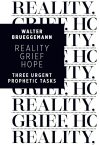
Reality, Grief, Hope: Three Urgent Prophetic Tasks
- Author: Walter Brueggemann
- Publisher: Eerdmans
- Publication Date: 2014
Walter Brueggemann is one of the most highly regarded Old Testament scholars of our time; talk-show host Krista Tippett has even called him “a kind of theological rock star.” In this new book Brueggemann probes the tasks performed by the ancient prophets of Israel and points out striking correlations between the destruction of Jerusalem in 587 BCE and the catastrophic crisis of 9/11 in AD 2001.
Brueggemann identifies a characteristic ideology of “exceptionalism”—chosenness, entitlement, privilege—which must be countered by prophetic realism and truth-telling. Denial must give way to honest grief. And, finally, widespread despair must be overcome by a buoyant hope. This sequence of ideology-realism, denial-grief, and despair-hope corresponds to Brueggemann’s unpacking of the books of Jeremiah, Lamentations, and Isaiah.
Walter Brueggemann through his teaching, lecturing, and writing, has effectively demonstrated the significance of the Old Testament for our fractured world today. Recognized as the preeminent interpreter of the ancient texts in relation to questions posed by a variety of academic disciplines, he has shown the way toward a compelling understanding of the major components of the faith and life of ancient Israel, especially in the Psalms, the prophets, and narrative texts of the Hebrew Bible. His award-winning Theology of the Old Testament quickly became a foundational work in the field.
Professor Brueggemann holds a ThD from Union Theological Seminary in New York and a PhD from St. Louis University. Now professor emeritus of Old Testament at Columbia Theological Seminary, he was formerly the William Marcellus McPheeters Professor of Old Testament at Columbia Theological Seminary in Decatur, Georgia. Before that, he was professor of Old Testament at Eden Theological Seminary in St. Louis. His many books, including The Threat of Life: Sermons on Pain, Power, and Weakness, exhibit a fruitful combination of imaginative power, sound scholarship, and a passion of justice and redemption.
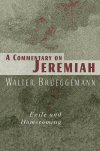
Jeremiah’s poignant lament over Judah’s social and religious disintegration reflects God’s own pathos-laden yearning for his disobedient covenant people. In this widely praised expository commentary Walter Brueggemann, one of the premier Old Testament scholars of our time, explores the historical setting and message of Jeremiah as well as the text’s relevance for the church today.
Offering a fresh look at the critical theological issues in the Jeremiah tradition, Brueggemann argues that Jeremiah’s voice compels us to rediscern our own situation, issuing an urgent invitation to faith, obedience, justice, and compassion.
This combined edition of Brueggemann’s original two-volume work, published until recently as part of the International Theological Commentary series, is an essential resource for students, pastors, and general readers alike. It is reprinted here with a new introduction by Brueggemann that surveys the current state of Jeremiah studies.
The pastor and the seminary student will find this book a very welcome addition to their library. Brueggemann’s exposition of the text is adequate in its detail, and always lucid. Helpful footnotes direct the reader to further reading on historical background and scholarly viewpoints . . . This book is a very readable guide to Jeremiah and will appeal to a broad section of the market.
—Hebrew Studies
Walter Brueggemann is the William Marcellus McPheeters Professor Emeritus of Old Testament at Columbia Theological Seminary in Decatur, Georgia. He is the author of numerous biblical commentaries and scholarly works, including A Social Reading of the Old Testament, The Threat of Life, Theology of the Old Testament, and The Prophetic Imagination.
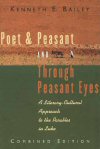
This volume is a combined edition of Kenneth Bailey’s intensive studies of the parables in the Gospel of Luke, Poet and Peasant and Through Peasant Eyes.
Bailey begins by surveying the development of allegorical, historical-eschatological, aesthetic, and existential methods of interpretation. Bailey combines an examination of the poetic structures of the parables with information about the cultural contexts in which the parables were told. Through its combination of literary and cultural analyses, Bailey’s study makes a number of profound advances in parabolic interpretation.
Bailey combines his rich personal experience of peasant life in and around the Holy Land with a penetrating theological and pastoral approach. . . . An informative and stimulating resource.
—Markus Barth, former professor of New Testament studies, University of Basel
Kenneth E. Bailey is Canon Theologian of the Episcopal Diocese of Pittsburgh and research professor emeritus of New Testament at the Tantur Ecumenical Institute, Jerusalem.
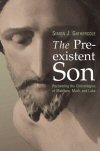
In this challenging book, rising New Testament scholar Simon Gathercole contradicts a commonly held view among biblical scholars—that the Gospel of John is the only Gospel to give evidence for Jesus’ heavenly identity and preexistence. The Preexistent Son demonstrates that Matthew, Mark, and Luke were also well aware that the Son of God existed with the Father prior to his earthly ministry. Gathercole supports his argument by considering the “I have come” sayings of Jesus and strikingly similar angelic sayings discovered in Second Temple and Rabbinic literature. Further, he considers related topics such as Wisdom Christology and the titles applied to Jesus in the Synoptic Gospels.
The Preexistent Son investigates and sheds considerable light on an important but neglected theme. Simon Gathercole, who has emerged in recent years as a major player in New Testament scholarship, demonstrates mastery of the relevant primary and secondary literature. I am impressed by the way he sifts through a great deal of complicated material and presents it in a clear and compelling way. Gathercole has thrown down the gauntlet . . . I recommend this book enthusiastically.
—Craig A. Evans, Payzant Distinguished Professor of New Testament, Acadia Divinity College
Simon J. Gathercole is lecturer for the faculty of divinity at the University of Cambridge. His other works include Heaven on Earth and Divine and Human Agency in Paul and His Cultural Environment
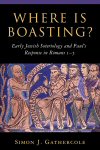
This important work challenges the validity of the “New Perspective” on Paul and Judaism. Working with new data from Jewish literature and a fresh reading of Romans 1–5, Simon Gathercole produces a far-reaching criticism of the current approach to Paul and points a new way forward. Building on a detailed examination of the past generation of scholarship on Paul and early Judaism, Gathercole’s work follows two paths. First, he shows that while early Judaism was not truly oriented around legalistic works-righteousness, it did consider obedience to the Law to be an important criterion at the final judgment. On the basis of this reconstruction of Jewish thought and a rereading of Romans 1–5, Gathercole advances his main argument–that Paul did indeed combat a Jewish perspective that saw obedience to the Law both as possible and as a criterion for vindication at the final judgment. Paul’s reply is that obedience to the Law is not a criterion for the final judgment because human nature makes obedience to the Law impossible. His doctrine of justification can therefore be properly viewed in its Jewish context, yet anthropological issues also take center stage.
Gathercole has offered a stimulating study that makes an important contribution to an ongoing debate that may perhaps, with the aid of commendable efforts like his own, enter into new and more fruitful stages of discussion.
—Journal of Biblical Literature
The volume is important for our understanding of the theology of early Judaism, for Pauline exegesis and theology and for New Testament theology in general. . . . Well written and persuasive.
—Evangelical Quarterly
Simon J. Gathercole is lecturer for the faculty of divinity at the University of Cambridge.
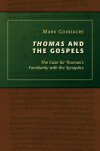
The Gospel of Thomas—found in 1945—has been described by Professor Bart D. Ehrman as “without question the most significant Christian book discovered in modern times.” Often Thomas is seen as a special independent witness to the earliest phase of Christianity and as evidence for the view that this earliest phase was a dynamic time of great variety and diversity.
In contrast, Mark Goodacre makes the case that, instead of being an early, independent source, Thomas actually draws on the Synoptic Gospels as source material—not to provide a clear narrative, but to assemble an enigmatic collection of sayings to affect the reader. Goodacre supports his argument with illuminating analyses and careful comparisons of Thomas with Matthew and Luke.
Meticulous, adroit, and closely reasoned, this work will immediately become the definitive presentation of the case that Thomas draws on the Synoptics. Those who take the contrary position truly have their work cut out for them.
—Dale C. Allison Jr., Richard J. Dearborn Professor of New Testament Studies, Princeton Theological Seminary
Mark Goodacre is associate professor in New Testament at Duke University, Durham, North Carolina. His other books include The Case Against Q: Studies in Markan Priority and the Synoptic Problem.
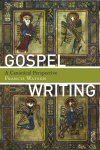
Having four canonical versions of one Gospel story is often seen as a problem for Christian faith: where Gospels multiply, so do apparent contradictions. In Gospel Writing, Francis Watson argues that differences and tensions between canonical Gospels represent opportunities for theological reflection, not problems for apologetics. Watson presents the formation of the fourfold Gospel as the defining moment in the reception of early Gospel literature—and also of Jesus himself as the subject. As the canonical division sets four Gospel texts alongside one another, the canon also creates a new textual entity more than the sum of its parts. It must play its part within an intricate fourfold composition, transforming its meaning and significance. In elaborating these claims, Watson proposes nothing less than a new paradigm for Gospel studies—one that engages fully with the available non-canonical material to illuminate the historical and theological significance of the canonical.
A wonderfully wide-ranging book, full of learning and insight. One of the most significant books on the Gospels in the last hundred years, this work will undoubtedly shake up the current study of the Gospels.
—Simon Gathercole, lecturer for the faculty of divinity, University of Cambridge
Francis Watson holds a research chair in biblical interpretation at Durham University, England. Well-known for his work in both theological interpretation and Pauline studies, he is also the author of Paul and the Hermeneutics of Faith.
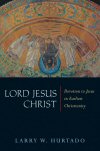
This outstanding book provides an in-depth historical study of the place of Jesus in the religious life, beliefs, and worship of Christians from the beginnings of the Christian movement down to the late second century. Lord Jesus Christ is a monumental work on earliest Christian devotion to Jesus. Larry Hurtado, widely respected for his previous contributions to the study of the New Testament and Christian origins, offers the best view to date of how the first Christians saw and revered Jesus as divine. In assembling this compelling picture, Hurtado draws on a wide body of ancient sources, from Scripture and the writings of such figures as Ignatius of Antioch and Justin to apocryphal texts such as the Gospel of Thomas and the Gospel of Truth.
Hurtado considers such themes as early beliefs about Jesus’ divine status and significance. He also explores telling devotional practices of the time, including prayer and worship, the use of Jesus’ name in exorcism, baptism and healing, ritual invocation of Jesus as Lord, martyrdom, and lesser-known phenomena such as prayer postures and the scribal practice known today as the nomina sacra. The revealing portrait that emerges from Hurtado’s comprehensive study yields definitive answers to questions like these: how important was this formative period to later Christian tradition? When did the divinization of Jesus first occur? Was early Christianity influenced by neighboring religions? How did the idea of Jesus’ divinity change old views of God? And why did the powerful dynamics of early beliefs and practices encourage people to make the costly move of becoming a Christian?
Hurtado has swum against the prevailing currents of scholarship in locating a well-developed Christology at the well springs of the Jesus movement in the Jewish community. His arguments may prove to be the most significant advance in New Testament studies in our times.
—Concordia Theological Quarterly
Larry W. Hurtado is professor emeritus of New Testament language, literature, and theology at the University of Edinburgh, Scotland.
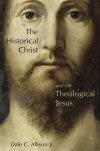
In this volume, which he describes as “my personal testimony to doubt seeking understanding,” Dale Allison thoughtfully addresses ongoing historical-theological questions concerning Jesus. What should one think of the modern quest for the historical Jesus when there is such enduring discord among the experts, and when personal agendas play such a large role in the reconstructions? How much history is in the Gospels, and how much history does Christian theology require that there be? How does the quest impinge upon conventional Christian beliefs, and what might it contribute to contemporary theological reflection? The Historical Christ and the Theological Jesus is the personal statement of lessons that a respected participant in the quest has learned throughout the course of his academic career.
The very title of Allison’s brief but engaging book signals that just as believers cannot be completely indifferent to the historical study of the Gospels without closing their faith to new challenges and insights, so historians, even if they are unbelievers, cannot escape the deeply theological nature of the life and teachings of Jesus. Allison is both refreshingly robust in his appraisals of the work of colleagues and disarmingly honest in his self-criticisms.
—Christian Century
Dale C. Allison Jr. is Richard J. Dearborn Professor of New Testament Studies at Princeton Theological Seminary. His numerous books include Studies in Matthew: Interpretation Past and Present and Resurrecting Jesus: The Earliest Christian Tradition and Its Interpreters.
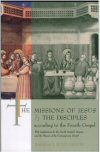
This important new work explores in depth the relationship between the mission of Jesus and of the disciples as presented in the Gospel of John, and explores the implications of these findings for the contemporary church. Based on a comprehensive semantic field of study that integrates biblical studies, theology, and missiology, this volume represents the first time such an approach has been used for the study of mission in John. Andreas Kostenberger begins by surveying the state of research on mission in the fourth Gospel, then covers foundational linguistic, definitional, and literary matters. The succeeding two chapters contain the actual study of the missions of Jesus and of the disciples. In discussing the disciples’ mission, special attention is given to the question of how later generations of disciples should be related to Jesus’ original followers. The volume concludes with a chapter on the implications of Kostenberger’s findings for the fourth Gospel’s purpose and for the mission of the contemporary church. Kostenberger engages recent missiological constructs based on the fourth Gospel, most notably the so-called “incarnational model” of mission, and concludes that this model is seriously flawed and should be replaced by a “representational model” that views Jesus’ followers as his representatives, who do not share in the theologically unique aspects of his incarnation.
An interestingly nuanced, in-depth, and balanced study with important theological as well as missiological implications for the contemporary church. This important study is of particular value to biblical interpreters, theological professors, missiologists, missionaries, mission leaders, and parish pastors and should be in their school and church libraries.
—Missiology
Kostenberger’s study has many strengths. It is well written and a number of important issues are resolved with clarity and conviction. Careful scholarship makes this book another valuable contribution to scholarly reflection upon the theme of mission in the fourth Gospel.
—Pacifica
Andreas J. Kostenberger is associate professor of New Testament and Greek at Southeastern Baptist Theological Seminary in Wake Forest, North Carolina. He is the author of numerous books, including A Theology of John’s Gospel and Letters and John in the Baker Exegetical Commentary on the New Testament.
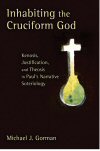
In this groundbreaking study of Paul’s soteriology, Michael Gorman builds on his influential Cruciformity: Paul’s Narrative Spirituality of the Cross to argue that cruciformity is, at its heart, theoformity—what the Christian tradition has called theosis or participation in the life of God.
Gorman deftly integrates the results of recent debates about Pauline theology into a powerful constructive account that overcomes unfruitful dichotomies and transcends recent controversies between the ‘New Perspective on Paul’ and its traditionalist critics. Gorman’s important book points the way forward for understanding the nonviolent, world-transforming character of Paul’s gospel.
—Richard B. Hays, professor of New Testament, Duke Divinity School
Michael J. Gorman holds the Raymond E. Brown Chair in Biblical Studies and Theology at St. Mary’s Seminary and University, Baltimore, Maryland. A highly regarded New Testament scholar, he has also written Reading Revelation Responsibly: Uncivil Worship and Witness and Elements of Biblical Exegesis: A Basic Guide for Students and Ministers.
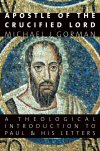
Unlike the many books that treat the Apostle Paul merely as a historical figure and his letters as literary relics, this new study by Michael Gorman focuses on the theological message of Paul’s writings, particularly what they have to say to the contemporary church. An innovative and comprehensive treatment of Paul, including commentary on all of the Pauline letters, Gorman’s Apostle of the Crucified Lord unpacks the many dimensions of Paul’s thought carefully and holistically. Six introductory chapters provide background discussion on Paul’s world, his resume, his letters, his gospel, his spirituality, and his theology, while the main body of the book covers each of the Pauline epistles. Gorman gives the context of each letter, offers a careful reading of the text, and colors his words with insightful quotations from earlier interpreters of Paul.
This book is written in a very accessible style to students of different levels, and at the same time it is a deep exploration of what lies at the heart of Paul’s theological vision. Michael Gorman provides a sure and steady guide to Paul, contextualizing his life, letters, and theology every step of the way. Gorman’s ability to emphasize the stories of the churches underlying Paul’s letters—the story within each letter—is a particularly welcome feature of the book. This is the best textbook on Paul I have found.
—Jeffrey S. Siker, chair of the department of theological studies, Loyola Marymount University
Michael J. Gorman holds the Raymond E. Brown Chair in Biblical Studies and Theology at St. Mary’s Seminary and University, Baltimore, Maryland. A highly regarded New Testament scholar, he is the author of Reading Revelation Responsibly: Uncivil Worship and Witness and Elements of Biblical Exegesis: A Basic Guide for Students and Ministers.
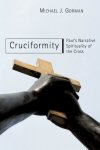
Most studies of Paul concentrate solely on his theology. This book breaks new ground by focusing on the source and nature of Paul’s spirituality. Taking his cue from Paul’s express desire to “know nothing but Christ crucified,” Michael Gorman shows how Paul’s personal experience of God constantly intersects with the story of the cross, an event that both reveals the cruciform character of God and shapes believers into a community of “cruciformity” (conformity to the crucified Christ). Expertly combining biblical studies and theological reflection, this noteworthy volume presents a model of the Christian life marked by faith, love, power, and hope.
This is a good read, and not only for those interested in Pauline studies or Christian spirituality. . . . In an undemanding style without assuming detailed knowledge of Paul’s letters on the part of the reader, it makes a good general introduction to the apostle’s theology.
—Pacifica
This scholarly work would make good reading during Lent and Holy Week.
—America
Michael J. Gorman holds the Raymond E. Brown Chair in Biblical Studies and Theology at St. Mary’s Seminary and University, Baltimore, Maryland. A highly regarded New Testament scholar, he is the author of Reading Revelation Responsibly: Uncivil Worship and Witness and Elements of Biblical Exegesis: A Basic Guide for Students and Ministers.
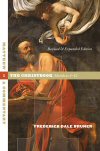
Recognized as a masterly commentary when it first appeared, Frederick Dale Bruner’s study of Matthew is now available as a greatly revised and expanded two-volume work—the result of seven years of careful refinement, enrichment, and updating.
Through this commentary, crafted especially for teachers, pastors, and Bible students, Bruner aims “to help God’s people love what Matthew’s Gospel says.” Bruner’s work is at once broadly historical and deeply theological. It is historical in drawing extensively on great church teachers through the centuries and on the classical Christian creeds and confessions. It is theological in that it unpacks the doctrines in each passage, chapter, and section of the Gospel. Consciously attempting to bridge past and present, Bruner asks both what Matthew’s Gospel said to its first hearers and what it says to readers today. As a result, his commentary is profoundly relevant to contemporary congregations and to those who guide them.
Bruner’s commentary is replete with lively, verse-by-verse discussion of Matthew’s text. While each chapter expounds a specific topic or doctrine, the book’s format consists of a vivid, original translation of the text followed by faithful exegesis and critical analysis, a survey of historical commentary on the text, and current applications of the text or theme under study. In this revision Bruner continues to draw on the best in modern scholarship—including recent work by W. D. Davies and Dale C. Allison Jr., by Ulrich Luz, and by many others—adding new voices to the reading of Matthew. At the same time he cites the classic commentaries of Chrysostom, Jerome, Augustine, Luther, Calvin, Bengel, and the rest, who, like Bruner himself, were not simply doctrinal teachers but also careful exegetes of Scripture. Such breadth and depth of learning assure that Bruner’s Matthew will remain, as a reviewer for Interpretation wrote, “the most dog-eared commentary on the shelf.”
Volume 1 of Bruner’s commentary is called The Christbook because the first 12 chapters of Matthew are focused on the nature and work of Christ. As Bruner proceeds through these chapters, he shows how Matthew presents, step by step, central themes of Christology: Jesus’ coming (chapters 1–4), his teaching (5–7), his miracles (8–9), his sermon on mission (10), and his person (11–12). Throughout the book there are also thoughtful discussions of significant topics such as baptism, marriage, Jewish-Christian relations, and heaven and hell.
Eminently readable, rich in biblical insight, and ecumenical in tone, Bruner’s two-volume commentary on Matthew now stands among the best in the field.
Often Bruner’s expositions are so apposite that the preacher will be tempted to lift them whole into the sermon, for they bring the biblical message explicitly into the life of the congregation.
—Dialog
Frederick Dale Bruner is George and Lyda Wasson Professor of Religion Emeritus at Whitworth University and scholar in residence at Fuller Theological Seminary. His other books include A Theology of the Holy Spirit: The Pentecostal Experience and the New Testament Witness and The Holy Spirit: Shy Member of the Trinity.
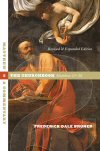
Volume two of Bruner’s commentary is called The Churchbook because Bruner sees Matthew 13–28 as concerned primarily with the life of the church and discipleship. Continuing his first volume (Christbook) exposition, Bruner shows here how the focus of Matthew shifts, from Jesus teaching about who he is to teaching mainly about what his church is. Bruner’s Churchbook commentary divides the second half of Matthew according to its major ecclesiological themes: the church’s faith (chapters 13–17), the church’s love (18–20), the church’s history (21–23), the church’s hope (24–25), and the church’s passion (26–28).
Eminently readable, rich in biblical insight, and ecumenical in tone, Bruner’s two-volume commentary on Matthew now stands among the best in the field.
This is the kind of commentary that I most want—a theological wrestling with Scripture. Frederick Dale Bruner grapples with the text not only as a technical exegete (although he also does that very well) but as a church theologian, caring passionately about what these words tell us about God and ourselves. Here he places his considerable teaching gifts at the service of the Christian community, caring as much about us as he cares about the text. His Matthew commentary is in the grand traditions of Augustine, Calvin, and Luther—expansive and leisurely, loving the text, the people in it, and the Christians who read it.
—Eugene H. Peterson, emeritus professor of spiritual theology, Regent College
Frederick Dale Bruner is George and Lyda Wasson Professor of Religion Emeritus at Whitworth University and scholar in residence at Fuller Theological Seminary. His other books include A Theology of the Holy Spirit: The Pentecostal Experience and the New Testament Witness and The Holy Spirit: Shy Member of the Trinity.
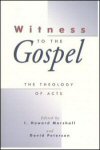
A Witness to the Gospel
- Author: I. Howard Marshall, David Peterson
- Publisher: Eerdmans
- Publication Date: 1998
- Pages: 626
A distinguished group of scholars here provides a comprehensive survey of the theology of the early church as it is presented by the author of Acts. These 25 essays, designed to show the current state of scholarship in ways accessible to students of the New Testament, discuss the main themes in the theology of Acts: God’s plan of salvation, the call of God and the spreading of the Word, the renewing work of the Holy Spirit, the relationship of Jews and Gentiles in the church, and more.
I. Howard Marshall is professor emeritus of New Testament exegesis and honorary research professor at the University of Aberdeen, Scotland. His many books include New Testament Theology: Many Witnesses, One Gospel and Beyond the Bible: Moving from Scripture to Theology.
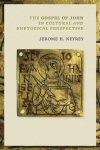
Given all that has been written about the Gospel of John over the past twenty centuries, can anything more possibly be said about it? Yes, says Jerome Neyrey—by reading this "maverick Gospel" in terms of ancient rhetoric and by viewing it in terms of cultural anthropology.
By interpreting the text in these two fresh ways, Neyrey distinctively illuminates the Gospel of John, casting new light on its theological message and on such topics as Jesus the revealer practicing secrecy, foot-washing as transformation ritual, and the Jewish background of Jesus equality with God, of Jesus being greater than Abraham. Neyreys scholarly study will certainly educate—and at times provoke—attentive readers.
Jerome H. Neyrey is Professor Emeritus of New Testament at the University of Notre Dame. His other books include Give God the Glory: Ancient Prayer and Worship in Cultural Perspective and the Gospel of John in the New Cambridge Bible Commentary .
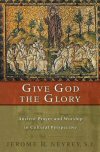
In this volume, Jerome Neyrey offers an intriguing work which seeks to bring readers into an understanding and appreciation of the “otherness” of the culture in which Christian scriptures and early church worship came to be. In Give God the Glory, Neyrey takes a new approach by reading the materials in terms of social science models and the theory of communication. He examines New Testament passages in context of both the Hebraic ethos and the Greco-Hellenistic culture in which these scriptures were conceived and written. Neyrey compares New Testament prayer and worship to contemporary works by classical authors, particularly Philo, the Didache, and a portion of Justin Martyr’s First Apology. Illuminating the New Testament text in their original light, this book focuses on interpretation rather than history, supplementing and enhancing the existing wealth of scholarship.
Jerome H. Neyrey, a Jesuit priest, is professor of New Testament at the University of Notre Dame. He received his PhD from Yale University, was associate editor of the Catholic Biblical Quarterly, and is currently associate editor of the Biblical Theology Bulletin.